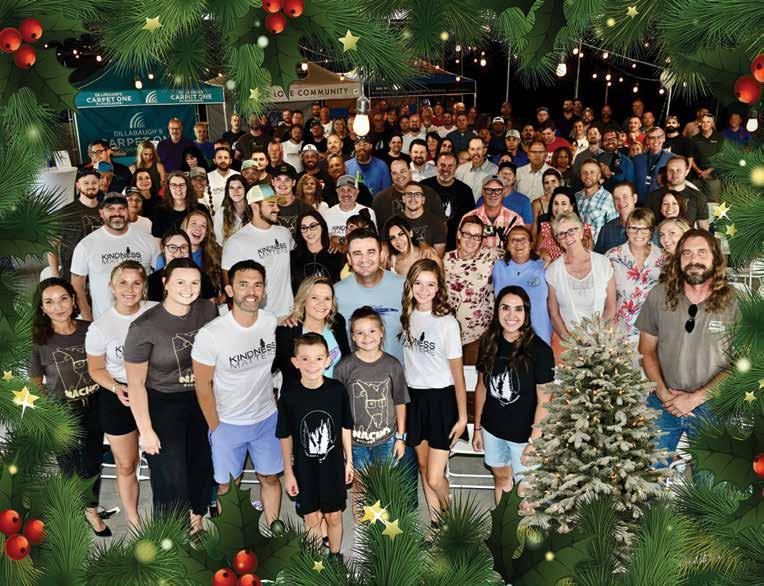GINA Bourasa
Building houses & hope

GREG Schenk
‘Paul Harvey of the Pulpit’
OLD TESTAMENT Figures
How they parallel Jesus
UPWARD Sports
Kid-based fun with faith






GREG Schenk
‘Paul Harvey of the Pulpit’
How they parallel Jesus
UPWARD Sports
Kid-based fun with faith





PUBLISHER
Sandy Jones • 208-703-7860 christianlivingmag@gmail.com
EDITOR
Gaye Bunderson editorgaye@gmail.com
Submit story ideas, article submissions & press releases
GENERAL INFO
christianlivingmag@gmail.com 208-703-7860
ADVERTISING & SALES
Kimberly McMullen • 208-703-7509 kim.bcliving@gmail.com
GRAPHIC DESIGN
Denice King • 208-918-5190 www.greentreedkdesign.com COVER PHOTO
Jill Davis Photography
CONTRIBUTORS
Larry Banta, Steve Bertel, Daniel Bobinski, Rick Chromey, Tom Claycomb III, Ryan De Amicis, Jenna Dexter, Roxanne Drury, Joan Endicott, Greg Grotewold, Leo Hellyer, Vincent Kituku, Rosie Main, Gary Moore, Bethany Riehl, Bradley Shotts, and Janet Thompson


By Sandy Jones
As we enter the holidays with reminders everywhere we turn of Jesus’ birth, I often find myself thinking about Mary, and her trip to Bethlehem on the back of a donkey. It makes my back ache just to think about it. Here she was 9 months pregnant, and undoubtedly feeling every ounce of the added weight she was carrying, both physically and emotionally. I’m sure it had been an incredible roller coaster since that angel visited her as told in Luke 1:28-34 NIV:
The angel went to her and said, “Greetings, you who are highly favored! The Lord is with you.”

Mary was greatly troubled at his words and wondered what kind of greeting this might be. But the angel said to her, “Do not be afraid, Mary; you have found favor with God. You will conceive and give birth to a son, and you are to call him Jesus. He will be great and will be called the Son of the Most High. The Lord God will give him the throne of his father David, and he will reign over Jacob’s descendants forever; his kingdom will never end.”
“How will this be,” Mary asked the angel, “since I am a virgin?”
I mean I’ve been told some incredible things in my life, but never anything close to this! And, I know it’s something often talked about in Christian circles – but can you imagine the scandal? People were a whole lot less tolerant in those days.
But who is this Son of the Most High? If God is His Father, how does King David figure into all of this? We could fill every page of this edition with so many facts about Jesus’ lineage. One of my favorite topics is to go back through His family line and see how God used everyday people, like you and me, some of them not so nice either, in Christ’s earthly genealogy. But for this column we’ll explore the Reader’s Digest

This tribute to our friend & colleague is a compilation of all his articles; Dan’s personal photos & art, even some that were never published. You’ll thoroughly enjoy this walk down memory lane.
Order Your Copy Today
condensed version of this: Who is Jesus? Why? Because I find it good to consciously reexamine Who He is, so I don’t take for granted His beautiful gift of Salvation.
In John 1:1 we’re told, In the beginning was the Word, and the Word was with God, and the Word WAS God (emphasis my own).
Wait! What? But He was born of a human. That’s true, but if we are to believe what the Bible tells us – “the Word WAS God,” again the emphasis is my own, but only because I think it’s sometimes missed. “The Word” here is Jesus.
CalvaryChapel.com explains this quite well: “Jesus embodied that total message, and that is why He is call the ‘Logos,’ or ‘Word,’ of God.” They go on to share that this is further backed by the verses found in Colossians 1:19 and 2:9.
BibleStudyTools.com expands on this even further, sharing that, “This one verse establishes the Word as being both divine and eternal in nature. Everything you read after this must be filtered through this reality that the Word was God.”
Before Jesus came, people lived under the Law of Moses, confessing their sins to their priest, who would then make atonement for them, which most often included a ceremony of sorts involving the sacrifice of an unblemished animal.
Jesus came as the fulfillment of that law – as the ultimate, unblemished sacrifice as atonement for all who believe in Him.
In John 14:6 Jesus told us Himself: I am the way, the truth and the life. No one comes to the Father except through me (NIV).
And Romans 10:9 NIV tells us that the gift is easy to receive: If you declare with your mouth, “Jesus is Lord,” and believe in your heart that God raised him from the dead, you will be saved.
It would be my hope, my prayer, that if you dear reader have not accepted this free gift, that this holiday season you will




prayerfully consider accepting Jesus Christ, the Son of the Living God, as your Savior. It is the ultimate gift, offered by the Ultimate Savior, and is the best gift you could ever give yourself. If you need help with this, please don’t hesitate to reach out to our Prayer Line at 208-968-1991 (hosted by The Idaho Chaplains Association).
In closing remember we serve the King of Kings, and the Lord of Lords. He Alone shall reign for all eternity. Aren’t we blessed to be called His sons and daughters?
Merry Christmas!
Until next time, God Bless! n
This time of year I often hear the lyrics to “Silver Bells” rambling through my head. City sidewalks, busy sidewalks, dressed in holiday style… and I remind myself that the Grinch got it right, it’s not about the boxes or bows, but most of us do Christmas shopping. As you’re out looking for just the right gift, or needing services yourself, would you please frequent our advertisers? When there, thank them for supporting Christian Living Magazine; you see, without them, there’d be no magazine, no e-copy, no website, no radio show – we need them, so that we can continue to bring you the hope and encouragement of God’s love, grace and mercy. Thank You!









By Steve Bertel
Greg Schenk and his four older sisters grew up on their parents’ farm in the little town of Rupert, in rural southcentral Idaho. His father and mother tirelessly worked the land – as did their children because, as Greg put it, “That’s the way it was done back then.”
“Back then” being through most of the 1970s.
And the family who worked together also worshipped together. “Both of my parents were strong believers, so my siblings and I were all raised in the Paul Congregational Church in the little town of Paul, Idaho, about five miles from where we lived,” he says. “It was a little country church. We had only one pastor. No associate pastor. And maybe only about 125 people in the whole congregation.”
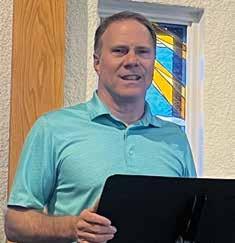
Worshipping came natural for Greg, since he came to know the Lord – surprisingly – when he was only five or six years old. “I became interested in spiritual things at that very, very young age,” he recalls. “My mother had bought me a set of Bible study records. And I absolutely consumed them! I loved listening to them. I loved hearing the Bible stories. And I loved going to Sunday school, and learning about the Lord.” In fact, Greg attended Sunday school for some twelve years, until he was eighteen years old.
Greg Schenk, shown here at the pulpit at Ten Mile Community Church in south Meridian, gives sermons in the same style as his “radio hero,” Paul Harvey, used to deliver the news. Schenk is a lay minister who occasionally substitutes for the church’s lead pastor; and when he does, congregants enjoy his Paul Harvey-like delivery.
Not only has Greg always had a deep-rooted love for the Lord, he’s also always had what he calls “a speaking ability combined with a certain level of creativity. In fact, when I was a kid, I used to practice delivering sermons to my mom.”
Then, “When I was old enough to start working, my parents asked me, ‘Would you be interested in working at the radio station? We know you love to talk, and you speak very well.’ Even at that young age, I spoke well,” he says.
In those days, Rupert was a small, tight-knit farming community where everyone pretty much knew everyone else. His parents not only knew the owner of KNAQ/KAYT (Rupert’s only two radio stations at the time), they also knew the woman who was the station’s administrative assistant. KNAQ was an automated FM rock station which broadcasted until 1 a.m. every day; KAYT was an automated/ live AM country station, a “daytimer” that broadcasted from sunrise to sunset.
So, intrigued by the idea – and, helped by his parents’ “ins” with the station – Greg interviewed with the program director.
And was soon offered a job. As a part-timer. “I was helping my dad farm and still going to high school at the time, so I would do the radio job whenever it fit with my schedule,” he remembers.
But one part of the job didn’t fit with his schedule; taking the job meant he had to work the early-morning Saturday/Sunday shifts, which also meant he had to make a big decision. “I loved going to church. I loved going to Sunday School. But I thought long and hard about it, and decided to take the radio job,” he recalls. “Our church’s youth group met on Sunday evenings so, of course, I could still attend those meetings. In my mind, that was the trade-off. Then, about six months after I was hired, I was assigned a different shift, and was then able to go back to Sunday School.”
Working the early shifts meant he had to arrive at the stations no later than 5:30 in the morning. “I remember one time, the snow was so deep and the weather conditions were so bad – Rupert can get some really bad storms, especially during the winter – that my dad drove me to work on his tractor, because it was the only vehicle we had that would get through the snow!”
Once at work, he was immediately busy: firing up the transmitters, taking the FCC-required meter readings, programming the automa-
tion computers, and checking the teletype for any overnight news stories, to be ready to go on the air live with the first-of-the-day local newscast at 6:05 a.m. “The national news aired at the top of the hour for about five minutes, then I would frequently follow that with our local news, which would go for about another five minutes or so. Then into music,” he says. With both stations being automated, he also had to keep a watchful eye on the computer systems, to make sure they didn’t malfunction anytime during his shift. So he had his hands full. Both KNAQ and KAYT were typical smalltown radio stations. They had a combined staff of only about a dozen people; the popular disc jockeys would host live afternoon shows or, during the summer, ongoing “remotes” from the Minidoka or Cassia County Fairs; they’d often run on-air contests where listeners could win record albums or T-shirts; and they’d air Christian programs on Sunday mornings.
“The Methodist Church would buy an hour of time and we would broadcast the services live,” Greg explains. “We also ran a few national Christian programs which would be sent to us on vinyl records, so all we had to do was play the record.”
At an age when most teenagers are known for lazily mumbling or going through age-related voice changes, Greg was very articulate … and had a distinctive “radio” voice. “I’d be shopping at a grocery store, for example, and a clerk or someone would recognize my voice. They wouldn’t recognize my face, of course, but they would certainly know my voice. And they would tell me how much they appreciated the way I delivered the news, that I did it so well!”
Prior to his first getting the job, Greg and his family had often listened to the radio – and to the commanding, articulate, yet folksy voice of one very famous and nationally-syndicated newscaster.
“Hello, Americans! This is Paul Harvey. Stand by … for NEWS!”
Greg says Paul Harvey soon became one of his “early radio heroes.” “I studied his delivery a lot. I was intrigued by his voice, his inflections. I always listened to his News and Comment noon show on the ABC Radio Network, but I really loved his The Rest of the Story segments – true, human-interest stories that always had surprise endings. I remember he ended each show with ‘And now you know … the rest of the story’ – with his famous, trademark pregnant pause in-between,” Greg says. “I also studied the delivery of our pastor, Vince Frank, of the Paul Congregational Church. He was a great orator, too; in fact, Pastor Frank taught me a lot about public speaking.”
At eighteen, Greg moved to the Treasure Valley and attended Boise State University, returning home during the summer months to be with his family and “dabble at” working a few shifts at the radio station.
Following graduation, he moved to Highland, Michigan – a suburb of Detroit – where he met the woman who would become his wife … and attended the Highland Congregation Church. “It was even smaller than our church in Paul!” Greg exclaims. Using his deep biblical knowledge, he began teaching Sunday school there. “And honestly, I was pretty good at it. I enjoyed it,” he admits. When the church’s only pastor decided he needed a “relief pitcher” so to speak, he tapped Greg. “And that’s when I started lay preaching.”
Of course, given his broadcasting experience, Greg was not at all intimidated to now be speaking in front of a full, live congregation. “In fact, when I stood up in front of the folks for the very first time, I told them, ‘You know, I’ve spent a lot of time in front of microphones. They do not intimidate me’.”
He goes on, “Of course, to step up to the pulpit and address a congregation, you have to have a certain level of confidence, almost a certain level of swagger, or else you are not going to succeed. You’re up there by yourself. What’s more, I’m absolutely convinced that, when I speak before any congregation, it’s God speaking through me. It’s the spiritual gift God has given me.”
Years later, Greg and his family moved to Boise, and he began attending the Ten Mile Community Church in south Meridian, serving first as a deacon, then on a small team of lay ministers in the congregation who occasionally step up to the pulpit and substitute for the church’s lead pastor, Ben Day.
Some feel watching and listening to one of Greg’s sermons is much like watching a painter create a masterpiece; each word, each phrase is another beautiful brush stroke … his timbre is eloquent, gentle, yet direct … with each sermon emphasizing Bible points by purposely including at least two or three of those strategically-placed, Paul Harvey-like pauses for effect. In fact, Greg usually begins his sermons lightheartedly, retelling one of his favorite Paul Harvey The Rest of the Story stories. Of which there are many. “I’ve always liked the idea of starting my sermons with an icebreaker. It’s just my personality. I may use the first few minutes telling some inspiring Chicken Soup for the Soul story, maybe even a Mike Lowe story, before getting into the Word. But most of the time, I’ll retell one of Paul Harvey’s stories that I find online,” Greg explains. “To me, it’s a way of bringing the congregation together, and enjoying that fellowship of togetherness. There’s a real value in that.”

Greg is also known for dropping a few pop culture references into his sermons here and there; for example, pointing out The Byrds’ well-known 1965 song “Turn! Turn Turn!” was inspired by verses of Ecclesiastes 3: “There is a time for everything, and a season for every activity under the heavens: a time to be born and a time to die, a time to plant and a time to uproot …”
Why does he do that? “Well, if you look at Jesus’ teaching and His parables, He related a lot of what He said to the culture of the day, to the people around Him, and to the way they lived. Of course, Paul did that to a certain extent, as well. A church cannot be entirely separated from its culture.”
Given his speaking gifts and the fact that he’s equally comfortable sitting in front of a radio microphone or standing at a pulpit, Greg admits he’s “thought a lot about” perhaps starting his own radio or podcast ministry someday. “Maybe when I retire,” he chuckles.
And now you know – as Paul Harvey used to say, with that trademark pregnant pause – the rest of the story. n
You can watch some of Greg’s past sermons on the Ten Mile Community Church website: https://tenmilechurch.org/sermon-speaker/greg-schenk/
Steve Bertel is a multi-award-winning professional radio, television, print media, and social media journalist, who retired after a 30-year broadcasting career. Now a busy freelance writer, he released his debut suspense novel, “Dolphins of an Unjust Sea”, available on both Amazon and Kindle. Steve and his wife of 41 years live in Meridian, Idaho. He can be reached at stevebertel65@gmail.com



By Daniel Bobinski
The Old Testament is rich with characters that parallel, or foreshadow, the person of Jesus, embodying various aspects of Jesus’ life, ministry, and redemptive work. By examining these individuals, we can solidify our understanding of God’s plan of salvation through the person of Jesus Christ.
Let’s start with Adam, the first man, who was directly created by God. Adam represented all of humanity and his actions affected the entire human race. Several times, the Apostle Paul referred to Jesus as the “last Adam.” It makes sense. Jesus was also created directly by God, He represented all of humanity, and, like Adam, His actions also affected the entire human race.
Side note: In the same way Adam was given dominion over creation, Jesus has all authority in heaven and on earth.
Let’s move now to Noah, that guy who built the ark. Whereas Noah warned his generation about the coming judgment, Jesus also warned people to avoid the final judgment. And, in the same way Noah emerged from the ark to a world cleansed from evil people, Jesus ushers people into a Kingdom that is free from evil.
Of course, we can’t forget Melchizedek, the mysterious king of Salem who was also a priest is sometimes discussed as a preincarnate Christ. As a “priest of God Most High,” Melchizedek’s appearance foreshadowed Jesus’ role as our eternal High Priest. Similarly, his kingship over Salem (which was likely an early name for Jerusalem) points to Christ’s sovereignty as King of kings.
The author of Hebrews emphasizes that Melchizedek appears “without father or mother, without genealogy, without beginning of days or end of life.” This description correlates to the eternal nature of his priesthood, paralleling Christ’s everlasting priesthood “in the order of Melchizedek.”
That brings us to Moses. Multiple parallels exist here, with Moses serving as Israel’s deliverer, mediator, and prophet (God’s mouthpiece). Just like Moses led Israel out of Egyptian bondage, Jesus delivers believers from the bondage of sin. And just like Moses mediated between God and Israel, Jesus is the mediator between God and all of mankind.
Another facet that links Moses to Jesus is the law. Moses was the lawgiver, bringing God’s law to the nation of Israel. At the other end of this picture is Jesus, fulfilling the Law and giving us a new commandment of love.

Next let’s talk about David, the shepherd who became king. As a boy, David cared for his father’s sheep. He led them, guided them, and protected them from being attacked. Similarly, Jesus referred to Himself as the Good Shepherd who laid down His life for His sheep, thus protecting them from eternal death. Jesus also leads and guides us, and if even one of His many sheep go astray, He goes after it to bring it back safely.
Eventually, David was anointed king of Israel, ruling over his people. Similarly, Jesus rose from the dead to become the eternal King of kings.
From here, I’d like to devote the rest of this column to the parallels between Joseph and Jesus, as there are many. That said, I must give credit where credit is due. The following comparisons are adapted from the book, “Gleanings in Genesis,” by Arthur W. Pink. In that book, Pink identifies more than 100 parallels between Joseph and Jesus. Here are just a few:
• Joseph was the beloved son of his father Jacob; Jesus is the beloved Son of the Father.
• Joseph had dreams of future sovereignty; Jesus prophesied His future sovereignty.
• Joseph obeyed his father’s command to check on his brothers, leading to his suffering; Jesus obeyed His Father’s will, even to the point of death on the cross.
• Joseph’s brothers conspired to kill him; the Jewish leaders plotted to kill Jesus.
• Joseph’s coat was taken from him; Jesus’ garments were stripped from Him.
• Joseph was thrown into a pit; Jesus descended into the grave.
• Joseph was sold for twenty pieces of silver; Jesus was sold for thirty pieces of silver.
• Joseph resisted temptation by Potiphar’s wife and did not sin; Jesus was tempted in the wilderness but did not sin.
• Joseph was falsely accused by Potiphar’s wife; the Pharisees falsely accused Jesus.
• Joseph was imprisoned despite his innocence; Jesus was unjustly crucified though He was sinless.
• Joseph was imprisoned with two other prisoners; Jesus was crucified with two criminals.
• One of Joseph’s fellow prisoners was restored; one of the criminals crucified with Jesus was saved.








• Joseph was exalted after his suffering; Jesus was exalted after His crucifixion.
• Joseph served Potiphar before becoming ruler; Jesus took the form of a servant before being exalted as Lord.
• Joseph provided grain to Egypt and other nations during a famine; Jesus is the Bread of Life, providing spiritual sustenance to all.
• Joseph brought peace to his family by reconciling with his brothers; Jesus is the Prince of Peace.

• God used Joseph to save many lives during the famine; Jesus came to save humanity from sin.
• People from all nations came to Joseph for help; people from all nations come to Jesus for salvation.
• Joseph forgave his brothers who wronged him; Jesus forgave those who crucified Him.
Each of the Old Testament figures listed above serve as parallel types of Christ, and each reveals different facets of Jesus’ character and work. In my opinion, this demonstrates the unity of Scripture and God’s consistent plan of redemption throughout history. I encourage readers to do further study into the Old Testament figures to gain a richer understanding of Christ’s role as Prophet, Priest, and King, as well as His work as Savior, Mediator, and Lord. n
Daniel Bobinski, Th.D., is an award-winning and best-selling author and a popular speaker at conferences and retreats. Reach him at danielbobinski@protonmail.com or (208) 649-6400.
A Christian art show and performance will take place at 6:30 p.m. on Thursday, November 7, at Vineyard Boise Christian Fellowship, 4950 N. Bradley St. in Garden City. The event is free, and childcare for children 10 and under will be provided.
The director of the church's arts ministry, Danica Thurber, said its fall show will be “Names of God.”
“Everything that's created is to explain, apply, and magnify who God has revealed Himself to be in the Bible. We'll present an hourlong performance consisting of spoken word, original music, skits, and dance, followed by an opening reception full of visual art and creative writing,” Thurber said.
For more information, go to vineartsboise.org. n
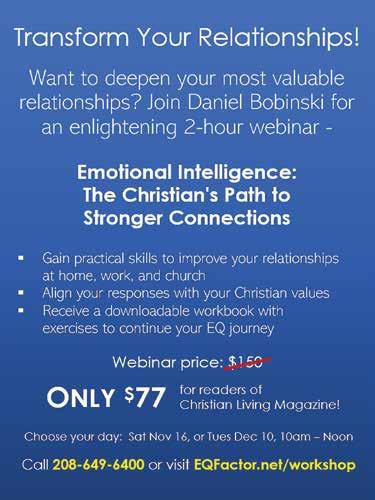
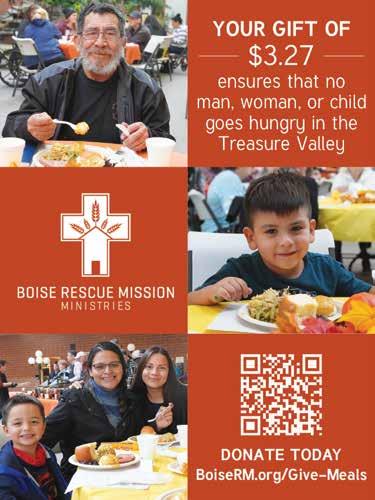
By Leo Hellyer
From time to time, all of us face some turmoil in our lives. We can experience turmoil in our families or with work, friends, elections, and even our churches. Each of us needs to be aware that when there is turmoil in our lives, we do not face that turmoil alone. God Almighty is right there with us. He is waiting for us to call upon His name.
I do not know about you, but for much of my life, I have waited to call upon God until I was miserable while facing the turmoil in my life. Why don’t we call on God in the beginning of a difficult season of our lives? Why do we go to God as a last resort, instead of going to Him immediately?
God can intervene on our behalf in many ways. Remember God does not force Himself upon us. He wants us to come to Him, openly, freely, compassionately, and humbly. One of the ways God intervenes in our lives is through divinely inspired songs that come to our attention at the perfect time. Radio station playlists are usually prepared days before hitting the airwaves. Have you ever been through something in your life, and suddenly, you hear the perfect song that ministers to your heart and soul? That is God intervening on your behalf.
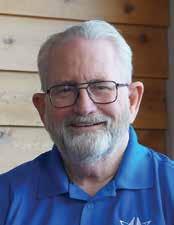
God using His unconditional love on behalf of His children did not just start in this technological age. God is the loving shepherd, taking care of His sheep, even when they stray. There is one chapter of the Bible which has ministered to people of faith throughout the ages, including now, and will continue to minister to the faithful for ages to come.
Before you continue reading this column, I would like you to take your Bible and prayerfully read Psalm 23 in its entirety. Read it without any distractions present. Let God speak to you, wherever you are in your journey right now…
On December 27,1970, a unique group of people recited Psalm 23 together. These believers did not recite the 23rd Psalm while reading it out of the Bible. None of them had a Bible because their captors took their Bibles from them. They had not seen a Bible for years. These individuals were American prisoners of war, who were held in Hoa Lo Prison in Hanoi, North Vietnam. This prison was called the Hanoi Hilton by the American POWs. This was a place of extreme torture: physical, psychological, and spiritual.
The POWs were able to recite the 23rd Psalm on the day of their first church service together, because they remembered it from their childhood, or they learned it in the Hanoi Hilton by using a tap code.
Psalm 23 has been put to song in many ways over the years. One of these spiritual songs is powerfully sung by Phil Wickham. It speaks directly to those who hear it along their journey of life. One


particular area of the song puts everything in focus when it says, “You’re the shepherd of my soul, You lead me in the right direction, My comfort and My protection.”
We do live in tough times. We can see godlessness in our communities, our nation, and the world in general. We do live in a world of darkness. We can be a light in the world of darkness. If we have Scriptures like the 23rd Psalm in our hearts, no one can take that away from us. We can recall it, and share it in any circumstance we find ourselves in. Even when going through extreme torture in a North Vietnamese prison camp, the American POWs felt the presence of God. Something important to remember, and never forget, is that God did not immediately remove them from the situation they were in. He gave them the strength, heroism, fortitude, faith and, yes, comfort to go through their challenges victoriously.
Right now, we are living in a world in turmoil. There are conflicts between nations around the globe. Many people are worried about what kind of world our children and grandchildren will live in. These are well-placed emotions and questions to have. It is especially important to remember that we are not living in a hopeless situation.
We are children of the Creator, God Almighty. He loves us unconditionally, even when we do stray. We face nothing alone; God is always with us. Protecting us. Guiding us. Loving us. Growing us. God never turns His back on us. He is ever-present. He will deliver us when we call upon His name.
There is no power greater than God Almighty; not the atomic bomb, not torture, not love, not hate, not disease, not politics, not elected officials, nor anything else. God is all powerful, but God is also all loving. Nothing catches God unaware.
God has all the answers. God IS the answer. Wherever you find yourself right now, seek God. Go through whatever you are facing currently with the wonderful assurance that God is with you. He is your “point man,” and He is “covering your six” at the same time. Get your strength from God alone. May God bless you abundantly as you face your challenges with Him by your side. n
Leo Hellyer is a non-staff pastor with a local church and has been married to his wife Norma for 50 years. The couple volunteered with the Boise FamilyLife Ministry Team for 20 years. Leo has also been serving with Boise Rescue Mission Ministries for more than 20 years and is currently serving at the River of Life Rescue Mission. He is president and chief firearms instructor with Helping Hands Firearms Training LLC. If you have questions about Real Man’s Toolbox, or need other assistance, he may be reached at silverplate426@msn.com or (208) 340-5544.



By Janet Thompson
No escaping it...the holidays are upon us, ushering in the temptations and frustrations of attempting to maintain a healthy diet.
I think the downward slide into unhealthy eating starts with Halloween and all the candy. Then fall recipes using yummy pumpkin always call for lots of sugar. Just as the last of the candy wrappers disappear in the trash, along comes Thanksgiving, the day we thank God for His provision by feasting.
Then only a few days later it’s already December 1 so Christmas parties start touting cookies, candy, fudge, eggnog, cakes, pies, and lots of calorie-ridden, fat-laden food! It’s easy to lose heart – literally and figuratively – and decide you’ll just throw caution to the wind and get back to healthy eating January 1.
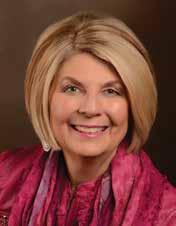
But hey, there’s all the nibbles and snacks watching the New Year’s parade and football, and it’s too cold to go outside and exercise so those extra few pounds over the holidays can quickly morph to a couple of new dress or pants sizes. Then it’s Super Bowl parties, Valentine’s Day, and the cycle just continues.
“I, Wisdom, live together with good judgment. I know where to discover knowledge and discernment.” – Proverbs 8:12
There really is a way to stay in control of your health and still enjoy the holidays. I do it every year and you can too, but you must have a plan in place. Pray in advance about how you’re going to deal with all the tempting food you’ll soon be encountering before you encounter it. Ask God to give you wisdom and discernment on what to eat, how much to eat, what to cook, how to cook it, and what to avoid.
Our usual tactic is to promise ourselves we’ll be good, and then when we get to the party, we throw caution to the wind…and then beat ourselves up the next day when we get on the scales. So here are some tips I’ve found helpful over the years.
1. I do get on the scales regularly so I can keep a handle on my weight. If you wait until you notice it in your clothes, chances are you’re going to have a tough time getting it off. If I see I’ve gained a few pounds, I take that seriously and lay off desserts and eat smaller portions until I lose the extra weight.
2. If you have an exercise regime, don’t stop. If you don’t have one, start. Even though the holidays can be crazy, do this for you. Give yourself the gift that keeps on giving. Exercise helps with stress, gets the endorphins pumping, and burns calories. Find a way to fit it in. In bad weather, take laps around a mall, or I’ve done laps inside a church. Get some friends to join you.
3. Take a green salad with olive oil and vinegar dressing to a potluck or party. That way you know there’s something healthy for you
to eat. As you go down the buffet line, take only a spoonful of things you really love and don’t go back for seconds. Be especially mindful of Jell-O salads usually loaded with sugar and fat.
4. When there’s a selection of desserts, have a small piece of the one you love the most. Or take tiny servings of several. If you bite into one and it isn’t as good as you thought it would be, don’t finish it!
5. Let your stomach guide you. Most of us feel uncomfortable when we overeat, so when you start to feel the belt or waistband tighten around your middle, STOP eating.
6. If you love bread, let yourself have a small piece but don’t use butter. If it’s store-bought dinner rolls, skip them.
7. If you’re out to dinner, make a visual line down the middle of your plate and only eat half of the meal. Ask for a to-go box for a tasty lunch tomorrow.
8. Drink water. Avoid punches, juices, soft drinks, and alcohol.
9. Enjoy stuffing or mashed potatoes without gravy. They’re delicious on their own or check out the mashed cauliflower recipe at the end of this article. Also, avoid “sauces.”
10. If you’re on a special diet like I am, take some of your own food or offer to bring it as a side dish for everyone.
11. Instead of feeling left out for dessert, again bring something you can eat. I brought a keto pecan pie to our family Thanksgiving dinner once. I have to admit, I was the only one who ate it, but when the pies came out after turkey dinner, I didn’t feel deprived.
I used to bring out all my recipes from my childhood holiday favorites and spend a day or two in the kitchen making cookies and candy. Then I realized I was the one eating most of it. So now, I pick a favorite or two and that’s it. Here are some ideas for making your recipes healthier:
1. Never use shortening in anything. Substitute coconut oil or even butter.
2. When a recipe calls for “vegetable” oil, if it’s a dessert, use coconut oil (you can melt it), grapeseed oil, or applesauce. For all other recipes use olive or avocado oil.
3. Cut the amount of sugar in half in recipes and use a sugar substitute like stevia, monk fruit, erythritol, or xylitol for the other half. Or stick with just half the sugar or use all sugar substitute. Avoid recipes that are pure sugar. They’re not good for anyone.
4. Use 2% milk, almond or coconut milk.
5. Substitute whole-wheat flour for some of the white flour in a recipe.
6. If you’re gluten-free or low carb, follow the recipes for the appropriate flours to use.






7. If you’re making cookies or sweets with the grandkids, send the goodies home. Remember that these holidays are not all about food. When you gather together with friends and family, it’s about fellowship as you thank God for His blessings and remember the greatest gift of all, His Son Jesus Christ. Give thanks to the Lord, for He is good! His faithful love endures forever (Ps. 107:1).
I’m thankful for the opportunity to share nutrition tips with you and appreciate you reading Christian Living Magazine. In Nutrition Nook, I share with you the desire to live the best life we can for the Lord and to love His gift of our precious bodies. Happy Thanksgiving and a Blessed Christmas – Janet
At Thanksgiving one year, I made mashed cauliflower for those like me who couldn’t eat mashed potatoes. Here’s a simple recipe I learned from an employee at Trader Joe’s. BTW, they also have frozen mashed and riced cauliflower at TJ’s, but they were out of the mashed when I was shopping so I made my own. n



1. Wash and cut a head of cauliflower into florets or buy a package of florets.
2. Put florets in a saucepan with Organic Bone Chicken Broth to cover about an inch up the pan.
3. Add 3 peeled garlic gloves.
4. Cook until the cauliflower is soft.
5. Season to taste, add a little butter if you choose, and mash in the pan with a hand blender or masher until desired consistency. Delicious!
Janet Thompson, award-winning Christian speaker, freelance author, and author of 20 books, is also the founder, director, and God’s servant of Woman to Woman Mentoring Ministry and About His Work Ministries. Her passion and focus is mentoring the next generation. Her tag line is, “Sharing Life Experiences and God’s Faithfulness.” She has a BS in Food Administration, MBA, and Master of Arts in Christian Leadership. Check out her books and sign up for her free weekly online blog and monthly newsletter at womantowomanmentoring.com. Join her on www.facebook.com/Janetthompson. authorspeaker, LinkedIn, Pinterest, X, and Instagram.


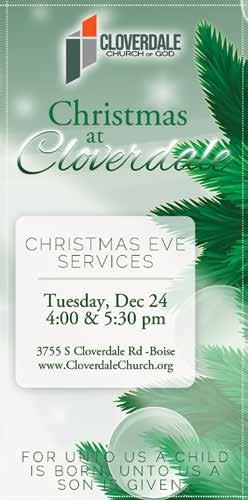
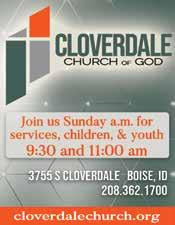



By Joan Endicott
While driving home from a conference recently, we were enjoying the warmth of the late afternoon along with the incredible color palettes of autumn: the rich golds and yellows, the brilliant reds, and the deep, dark greens—and every combination in between.
Traffic began to slow as we drove past a well-manicured cemetery that sits high atop a ridge, where the beautiful view is, my mind simply making note of the lovely locations of so many cemeteries. Then I saw him—a tall, slender silver-haired gentleman standing all alone, one hand in his dress-pant pocket, his other hand cradling the side of his face as he looked down toward a gravestone. Without time to even process, tears welled up automatically as I thought of his loss, wondering, is it his wife he grieves for, or another loved one? I prayed silently, “Dear Jesus, please hold and comfort him as only you can—giving him your peace that passes all understanding.”
Then, I thought of Leo Buscaglia’s story. Leo told about a contest he was asked to judge. The purpose of the contest was to find the most caring child; the winner was a four-year-old boy. His next-door neighbor was an elderly gentleman who had recently lost his wife. Upon seeing the man cry, the little boy went into this gentleman’s yard, climbed into his lap and just sat there. When his mother asked him what he had said to the neighbor, the little boy said, “Nothing. I just helped him cry.”
Though not knowing yet presupposing that the man in the cemetery was grieving for his beloved, my soul ached deeply for his— while offering another passionate prayer that neither my beloved nor I would ever know that kind of grief. I wondered about his story. Does he know The Savior who offers eternal life—giving him hope beyond this life and this grave? Does he have others who provide care and compassion—who, as the four-year-old boy poignantly demonstrated, simply sit with him and help him cry? My thoughts naturally drifted from his grief to another loved one’s grief, then eventually to my own.
It’s been a year of huge loss, enormous heartache, and one grief after another for so many. It’s painful no matter how or when grief arrives as an unwanted—suffocating—companion. If you, too, are in this season, I’m so deeply sorry for all you are suffering, my friend. Your pain is normal. Your feelings are legitimate. You’re not alone. At the most recent memorial service we attended, a best friend of the deceased shared with me, “I’ve come to realize that at this age,

this is what life holds for me now…it’s a season of ongoing loss.” Christians do grieve differently, yet we grieve so very deeply. Grief is an ongoing journey, as Donna Ashworth captures so well in the following:
You don’t just lose someone once. You lose them over and over, sometimes in the same day. When the loss, momentarily forgotten, creeps up, and attacks you from behind.
Fresh waves of grief as the realization hits home, they are gone. Again.
You don’t just lose someone once, you lose them every time you open your eyes to a new dawn,and as you awaken, so does your memory, so does the jolting bolt of lightning that rips into your heart, they are gone. Again.
Losing someone is a journey, not a one-off. There is no end to the loss, there is only a learned skill on how to stay afloat, when it washes over. Be kind to those who are sailing this stormy sea, they have a journey ahead of them, and a daily shock to the system each time they realize, they are gone. Again.
You don’t just lose someone once, you lose them every day, for a lifetime.
—Donna Ashworth
I can so relate to this with having my own mom leave this earth when she was only 46 years old and I was 23. I can’t begin to count the times I’ve so longed for a mom who I could have called to share something great to celebrate, or to console, hug and comfort me when suffering life’s heartaches. I feel it’s important for me to share this as well. My mom was not healthy before passing—neither physically nor in other ways, so it’s not my mom as she was that I miss, rather, a healthy mom/daughter relationship. I’m grateful for learning the importance of grieving the lack of that kind of relationship as well. We get to give ourselves grace to grieve all loss: through death, of course, but also any other category of loss—rejection, estranged relationships, what might have been, etc. The death of a dream or relationship can be equally devastating.

Have you given yourself the grace to grieve any and all loss? If not, I want to share something that has helped my clients in over 30 countries find a new sense of freedom in this area: the practice of selfcompassion. I know that for most of us, especially if our childhood lacked compassion, it’s a completely foreign concept. Though unnatural at first, once learned, you can change how you think about yourself, and your self-talk shifts from critical to compassionate. Just imagine the difference this would make for you! Amid loss, heartbreak and grief, our parched souls are desperately yearning for the quenching effect that love, patience and kindness provide. Because you, more than any person on this planet, know the width and depth of your hurt, who better to provide the desired compassion to you, than you?
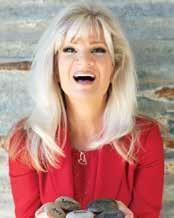
Dr. Kristin Neff, researcher and expert on self-compassion, shares: “Having compassion for oneself is really no different than having compassion for others. Derived from Latin, the term refers to how we’re with (com) suffering (passion). Think about times when you’ve felt compassion for a close friend who was suffering. First, to experience compassion you have to actually notice that your friend is struggling or feeling badly about themselves. Second, if what you feel is compassion (rather than pity), you realize that suffering, failure, and imperfection is part of the shared human experience. ‘There but for fortune go I.’ Finally, you respond to your friend with warmth, understanding, and kindness—feeling the desire to help in some way. These are the three main elements of compassion: mindfulness, common humanity, and kindness.
“Self-compassion simply involves doing a U-turn and giving yourself the same compassion you’d naturally show a friend when you’re struggling or feeling badly about yourself. It means being supportive when you’re facing a life challenge, feel inadequate, or make a mistake. Instead of just ignoring your pain with a ‘stiff upper lip’ mentality or getting carried away by your negative thoughts and emotions, you stop to tell yourself ‘this is really difficult right now,’ how can I comfort and care for myself in this moment?” –Dr. Kristin Neff
To help you get started, here is a simplified version of exercises I teach. It’s essential to give yourself the time and space to do this—ongoing! Keep a journal just for your important self-compassion journey.
Joan’s A B C’s of Self-Compassion:
A – Attitude of Loving Kindness to Yourself.
You are an image-bearer! Ask the Lord to help you learn to love yourself as the wonderful creation you are. Think and speak to yourself the way you would to your best friend and loved ones. Ask yourself
“What would I say to my loved one in this same situation?” Then, “What else?” Keep going! The deeper you go, the sooner you experience greater freedom.
B – Be Mindful.
Being aware and open to the realities of the present moment are necessary for offering ourselves compassion. When you are in a painful place and somehow suffering, acknowledging this is the first step in getting through it in the healthiest way. It’s natural for us to go right into trying to FIX it, rather than first letting ourselves FEEL it. Please, FEEL FIRST, then fixing comes more naturally. Ask yourself, “Have I given myself the soul space, place n’ grace to fully feel this?” Then follow up with, “What more could I do to let myself fully feel this?”
C – Common Humanity.
Feeling separated, alone, or isolated can be a downward spiral which leads us into a dark dungeon of despair. If not challenged, it can keep us on a self-shaming, critical mental merry-go-round. We have the power to interrupt negative thought patterns and destructive dialogue by simply reminding ourselves that all loss, grief, struggle and suffering is part of the human condition—common to all humanity. Ask yourself, “What am I feeling right now?” Then, “What compassion can I offer myself in this time of grief, loss struggle or suffering?”
Whatever you are going through, please remember you are not alone. While I pray these ideas and tools serve you well, it’s important that you have a loving and supportive church community. As I have walked the most grievous times in my life, it is the Jesus-loving, Biblebelieving, prayer-warrior “Davids” who I relied upon as I trusted them to stand in the gap, doing battle for me against my “Goliaths” when I could not do it for myself. While we know that grief is the price of love, it is Jesus’ love and ultimate sacrifice that does give us HOPE beyond this life—beyond this grave.
Aren’t we blessed beyond measure to have such lavish hope, my friend? n
Grab your FREE copy of Joan Endicott’s “I Get To!”® book at www.JoanEndicott.com. Also, be one of the first to get her 2nd book,“I Get To!”® Own My Worth! Joan is an Award-Winning Keynote Speaker, Author and Coach whose coaching has reached over 30 countries. Find out more about her speaking and coaching here: www.JoanEndicott.com
Author’s note: For more on Joan’s personal grief journey this year, see her prior column in the Sept./Oct. issue.



By Tom Claycomb III
I love big game hunting. The whole experience. The hunt, boning it out, packing out the game and making my own sausage. And luckily, my family loves eating it. I just fried up a backstrap for dinner last night and it has all disappeared.
But what if you don’t tag a deer/antelope/elk/ moose? Is all lost? Was it a waste of time? Are you a loser? Let’s talk about this topic today. I think whatever venture we do in life we want it to be successful, but obviously we can’t hit a home run every time we step up to bat. I just got back from an archery deer/elk hunt a couple of days ago so all of this is fresh on my mind.
So, what should our response be? Que sera, sera? If you have that attitude, then you’ll go through life only halfheartedly trying at everything you do. You can’t approach life with that attitude or you’ll never amount to anything.
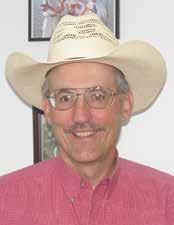
My father-in-law used to always say, “Show me a good loser and I’ll show you a loser.” But our happiness shouldn’t be totally controlled by our latest success rate.
I used to rodeo a lot. At the end when I went pro, if you got thrown or had some bad rides, the week got to be dark until the next weekend and you redeemed yourself with a good ride.
I then encountered the same scenario in my hunting world. I like to plan and make lists. If you don’t plan, then you have planned to fail. But does that mean that every hunting trip is a failure if I don’t kill something? Or every fishing trip is a bust if I don’t get a cooler full of fish?
I didn’t know how to handle this but reached a point where I refused to let my circumstances dictate my happiness. I periodically heard people say that there is happiness and there is joy. I couldn’t figure that one out for a while but finally have.
Happiness is a fleeting lover. If everything goes exactly to plan. The weather is 68-71 degrees, you tag a huge bull, you drop him 100 yards off the trail etc. etc., then you can be happy. If not, so sorry. Maybe happiness will land on the next hunt.



I refuse to live like that. I’m not going to let my circumstances determine my level of joy. There is a difference in joy and happiness. Happiness is determined by what is going on/happening right now. Joy is what is going on inside of you.
If you live according to your plans, God has no room to intervene with a divine appointment. Your life is built around your plans. Yes, I still plan to the max but now and then God, well, acts like God and intervenes and does something wayyyy cooler than what I had planned. Be open to that.
Think about it in your work world. I used to go to work every day with a game plan; 95% of the time my boss let me focus on whatever I saw as important because I set goals to obtain what he was wanting anyway. But every now and then he came in and totally changed my direction and game plans. I think it’s somewhat the same in our spiritual world.
So, what if I go on a hunt/fishing trip and don’t get anything but I get to witness to someone or encourage them in the Lord? Is that not a great day? Think of Philip being zoomed over to save the Ethiopian eunuch. Or Jesus randomly meeting the woman at the well. I think I need to be more fluid and open to God running things instead of me.
I’m not there yet but maybe when you take a kid fishing or hunting and they have the time of their life, maybe in the face of eternity that is just as good of a deal as being by yourself and tagging a big bull. I think we have to choose to chase after joy and not happiness.
Christian Tip #6: I heard a cool quote once.
Religion is sitting in church and thinking about hunting.
Christianity is being out hunting and thinking about Jesus. n
For more information about anything in this column, contact Tom at tomclaycomb3rd@gmail.com.













By Gary Moore
I don’t know what you were doing to earn a living when you and your spouse were dating. But I can tell you what business you were in. You were in sales and marketing. You were “selling” an image you hoped your boyfriend or girlfriend would “buy,” and they in turn were doing the same. Thus, depending on how long you dated, and the depth of your discussions, you really didn’t know much about them when you got married. Oh, you probably thought you did, but you really didn’t. You actually married an image of a person. You took what you knew and what you hoped for, and then built an image of who you expected that person to be – how they would think and act, how they would interact with you and treat you.

When you said, “I do”, you began a lifelong journey of discovery. You may not have planned on it, but that is what happened. This journey of discovery started off very innocuously. Since you knew you had been in the sales and marketing business, you tried to maintain the façade that you had been selling. What you didn’t realize was that when you were dating, it was a very controlled environment. You knew what time you were going to pick up your date, where you were going to go, what you were going to do –and for how long, and when you would return her to her place of residence. In that kind of situation, it’s relatively easy to keep up the façade.
But when you got married, you were now in close proximity for extended periods of time in an uncontrolled environment. Thus, it was hard to keep up the façade. And with neither of you wanting to do anything to dampen the euphoria you were feeling, when little “irritating discover ies” came up – since no one had taught you how to address them –you ignored or repressed them.
As you did this, you were unknowingly set ting up a way that the two of you would interact and “handle” the little irritating discoveries of each other. This avoidance pattern continued in your relationship. In fact, you developed a method of interaction that was unhealthy and would have a longterm negative affect on your relationship.
When you were dating and going through your “sales and marketing” phase, you read the cover. You even turned the book over and read on the back the comments that other people said about the book – and all of them were positive. No red flags here. Then as your dating relationship continued, you scanned the table of contents. You knew there was more to learn about the person, but you told yourself, I don’t need to worry about that now. That will come and it will be fine.
You then “read” the preface. This reading was an accumulation of conversations over time. This preface reading gave you some context and more information about your future spouse. You learned about their family – their mother and father and siblings. You also learned about where they grew up and where they went to school. And as you “read” these things, they were all presented in the most positive light possible.

As the little irritating discoveries began to build up and create distance between you, you began to entertain some crazy thoughts. What happened to the person I married? I don’t really know this person. I don’t know if I like that about them. Did I marry the right person?
As most couples do, you entered the marriage relationship with an idealized set of hopes, dreams, and desires. No one had really taught you what to expect after the “hormone happiness” wore off. What was marriage really going to look like over the long haul?
As you reflect on your spouse, and especially the beginning years of your marriage, I would like you to think of your spouse as a book.
As you continued to date, you moved to the introduction of the book. Like the introduction of actual books, the introduction conversations you were experiencing gave you a broader understanding of context and tone for the discoveries you were making about this person. What you didn’t realize was that when you said, “I do”, it was just the beginning of the book. You had read the cover, the back cover reviews, scanned the table of contents, read the preface, and perhaps, even the introduction. But you hadn’t yet read the book. As with all novels, you didn’t fully know the main character, the supporting cast, or how the plot would develop. Like many novels, there would be plot twists that you didn’t understand or chapters that you didn’t particularly like. Yet you kept reading the novel. And why? Because even though there were parts of the characters you didn’t appreciate and parts of the plot that you did’t like, overall, it was a good book.
And so it is in marriage. As you continually discover who your spouse is, there may be parts that are irritating and that you don’t like, but the overall “book” is good – and good for you. Enjoy your lifelong reading plan.
Don’t judge a book by its cover. n
Gary Moore served as associate pastor at Cloverdale Church of God for 15 years. He does couples’ coaching and leads couples’ workshops and retreats called MUM’s the Word. He has a weekly radio program – Life Point Plus – on KBXL 94.1FM at 8:45 a.m. on Fridays. His website at www.mutualunderstanding. net has video teachings and other resources for couples. He may be contacted at glmoore113@gmail.com.
Residents of Meridian and nearby communities will get the chance to open their pantries and hearts to benefit those in need at the seventh annual “Interfaith Community Food Drive” on Sunday, December 8, from 2 to 4:30 p.m. The event will be held at the parking lot of Vertical View Climbing Gym, 1334 E. Bird Dog Drive, near the intersection of Locust Grove and Overland roads. It is sponsored by the Meridian mayor’s Interfaith Council, a group representing churches and charitable organizations in the area.
It is a “no contact” event, according to Shannon Smurthwaite, a member of the Interfaith Council and the event organizer, to make it easy and safe for those who wish to contribute.
“‘No contact’ means that you simply drive to the parking lot, where you need not even get out of your car. Volunteers, including many of our civic, ecclesiastical, and teen leaders, will accept non-perishable donations from your vehicle’s trunk or through the windows,” Smurthwaite said. “We also accept donations of cash in sealed envelopes, new blankets in all sizes, and Walmart gift cards for local women’s and children’s services.”
The donated items will be distributed among food banks in Meridian and other nearby communities. In past years, thousands of pounds of food were collected and significant cash donated in two hours as a result of the event, all passed on to help curb food insecurities in families needing a little extra help this winter.
“Service to others is an important part of what makes Meridian such an amazing community,” said Mayor Robert Simison, who participates each year. “I appreciate the ongoing efforts of the Interfaith Food Drive to feed those in need.”
For more information, contact Smurthwaite at 406-672-3733 or meridianfriendsoffaith@gmail.com. . n
Steve Bertel
Fill in each answer, one letter per square.
Then ar range t he letters in t he highlighted squares to reveal t he name of …
1. T he book of Jeremiah reminds us, “For I know the plans I have for you,” declares the L ord, “plans to prosper you and not to har m you, plans to give you hope and ___ ___.”
2. One of the five kings of Midian
3. After Dav id feigned madness before Abimelech, he said, “I w ill bless the L ord at all t imes; His praise shall ___ be in my mouth.”
4. He reigned for only three mont hs

Supplemental Income Trust, also know as a Charitable Remainder Unitrust, can provide supplemental income for the rest of your life and then carry over to your family for their lifetime to help protect and provide for their financial future.
Significantly increase the gift to your loved ones over their lifetime. Receive tax benefits now. Give 100% to your family and then 100% of the remainder to help others.




By Gaye Bunderson
Gina Bourasa sold houses as a real estate agent and helped build them as a CEO with a local Habitat for Humanity. Now, she builds hope into people’s lives.
Bourasa presently serves as president of Fuller Center for Housing – Building Hope Project, an organization she founded in 2021. The evolution of her founding the non-profit actually began with Habitat for Humanity.
“I stepped away from real estate about seven years ago to serve as CEO of the local Canyon County Habitat chapter until they could find someone else. Six months turned into a year – the timeline kept expanding. I stayed with it because I wanted to prepare the next person.
“But that’s where I found my purpose,” Bourasa said.
“Belonging to a large franchise, you have to do what they say, when they say it,” she explained. “I wanted all of our funds to be used for our local communities. I knew what God wanted me to do: to sew seeds into the community.”
She switched from Habitat to an organization called Fuller Center for Housing, whose primary mission is affordable housing. Fuller Center provided a more grassroots platform that the board and Bourasa felt more aligned with. Two short years after founding Fuller Center for Housing – Building Hope Project, she then founded another non-profit called Building Hope Project Inc. Bourasa runs both organizations simultaneously. While the focus of Fuller Center Building Hope Project is affordable housing and affordable home repairs, the sole mission and vision of Building Hope Project Inc. is about building hope in people’s lives and continuous acts of compassion in the community.
Bourasa is a cancer survivor and knows what it’s like to hope for a good outcome. “I wanted to put hope back into people’s lives,” she said. “I always wanted to help people, and now I’ve been doing it for 30 years or so. For 10 years I wanted to start a non-profit, and I was going to call it Building Hope – and I knew that’s what it was going to be,” she said.
She builds more than just houses now…she builds HOPE. That can look quite different to different people; but in the broadest sense, according to Bourasa, “We help all people in need who have lost hope.
“As it says on the website at buildinghopeidaho.org, ‘we want to build hope, strength, stability and self-reliance through continuous acts of compassion’. Building Hope is dedicated to giving a HAND UP, not a hand-out.”
They help all people in need who have lost their spirit of optimism, such as homeless veterans or the elderly – or in fact anyone.
Bourasa maintains a Building Hope office at Homes of Idaho Inc. in Eagle. The owner, Colby Lampman, is on the Building Hope Board of Directors along with his wife Kassy.
“He lets me have my office and he’s been a board member for the last four years. He and his wife are amazing leaders. All the board members are Christian and involved in church. We’re unapologetically a Christian organization,” Bourasa stated. Her experience with a life of faith began in childhood.
“I went to Christian school all my life. My parents have been married for 60 years, and they taught me to respect people. They taught me to love God, work hard, and help people. My dad made me and my brother workaholics and instilled in us the great importance of character.”
She regularly puts in 18- to 20-hours a day, she said, but she has no complaints. “I love my life. I’m so content. I’m busy. I’m happy.”
The 59-year-old Bourasa is passing on the family work ethic. Bourasa takes her 9-year-old daughter Nevaeh (actually her ad opted granddaughter) along with her on service projects. “She always goes with me. I’m trying to give her a servant’s heart while she’s young. She’s changed my life as much as I’ve changed hers.”
The Building Hope board members and friends often head to downtown Boise to help the homeless. “We give them water, food, and a card with encouraging messages,” stated Bourasa. “I was fearful at first, but we are acting as the hands and feet of Christ and we get a good reaction.

Together we can do great things!
what we do the public doesn’t know about, and no, we don’t do it to get the attention.”
Building Hope used to be funded by sales at Caldwell’s ReClaim Store, a home improvement store that sold new and gently used items to the public at a fraction of the retail cost. But the ReClaim Store shut on March 1.
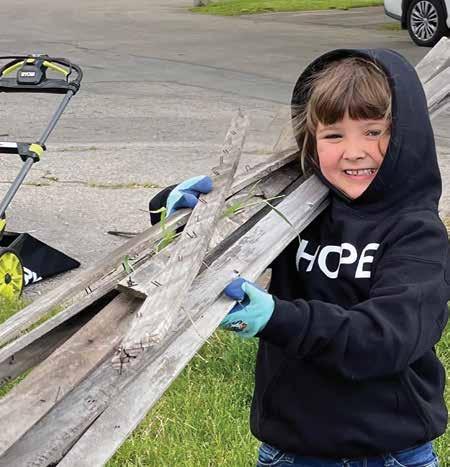
“This is a ministry. It’s exhausting. It’s hard to be positive all the time – we encounter needs that are greater than what we can do.”
Bourasa is never entirely off the clock when it comes to service. Despite her homeless ministry and her hours-long commitment to Building Hope, she recently discovered she had a very needy neighbor – and in fact, the neighbor was in need of food.
“Here I am,” she explained, “passing out ‘meals of hope’ to strangers and I didn’t know a neighbor wasn’t eating. I took her a bag of cutie oranges and she said that if she only ate a half a day, she could make them last for three weeks.
“The woman, in her late 70s, is on a fixed income and she cried when I gave her some food – she hadn’t eaten in several days. She’s on my radar. I look out for her now.”
Also, God put women who are in a recovery program on her heart.
“I take care packages to the recovery centers with our cards in them, telling the people they have purpose. Ninety-five percent of
Explained Bourasa: “It was becoming more than what we could do. It became a full-time business and was taking away from our mission. We had it open for 14 years, so it was a hard decision.”
The store helped fund the ministry but became too much to handle. Funding now comes solely from grants and donations from businesses. “If an elderly person or a veteran needs a ramp, a business may donate the products and the labor.” How did she learn her skills: meeting the public, seeking funding, reaching out to the hopeless, and connecting with those who can help?
“I’ve been in the area all my life and I have strong ties to the community. I love shaking hands and telling our story – I’ll tell anybody who’ll listen. People know me and they trust me. I love my job. When I get up every day, I know I’m going to help somebody, but I don’t always know who. I want to make a difference in people’s lives,” Bourasa said, stating making a difference can be as small as a smile or an encouraging word or as big as the generous purchase of groceries.
Acts of service, mixed with hope, can go a long ways. What does hope look like for people? It depends.
Building Hope constructed a wheelchair ramp for a veteran – “and that was as important to him as the boxes of food for my neighbor.”
During the holiday season, Building Hope partners with KTSY for its Christmas campaign for the needy. It also works with Operation Grateful Hearts, providing “holiday meals of hope.” The non-profit does these things all year long; but during the holidays, it works with two selected organizations “for a bigger impact,” said Bourasa. To help out or for more information, email gina@buildinghopeidaho.org. Her website is at buildinghopeidaho.org.

By Gaye Bunderson
The world of sports is all about winning, right? Wrong. At least for one organization.
There’s nothing wrong with wanting to win, but Tim Fulwood of Upward Sports at Boise’s Tree City Church said the faith-based program for kids ages K-6th grades defines winning differently. Quality playing is emphasized, sure, but the scoreboard is secondary to building Christlike character.
“Upward teaches virtues such as respect, kindness, and forgiveness,” Tim said.
Upward Sports was founded in 1995 at a church in Spartanburg, S.C. by a small group of believers. But the original founders got caught up in envisioning it as a national organization – and, now, it’s in 2,000 churches across the country. (See upward.org)
Tim and his wife Naomi oversee an Upward Sports program in the Treasure Valley, and it all started when Tim began searching for an area of ministry to get involved with in the early 2000s. “I started praying for a way for God to use me,” Tim said, “and for me to serve Him.”
The pastor of the church he was attending gave Tim a VHS tape about the Upward ministry. Stated Tim, “I watched it and got excited.” So excited he wanted to sign up for the program immediately...until his pastor told him, “Whoa, slow down!” The pastor thought Tim should explore the program a bit more before zooming off to sign up.
Tim and Naomi heard about a branch of Upward that had launched in Nampa, and they signed their children up to participate. So the family got their feet wet in Upward Sports when the younger Fulwoods started playing.
Now the adult Fulwoods (their children are grown now) have overseen the local program for 20 years, with only a brief time of stepping aside before the Lord drew them back in. They originally offered a variety of sports throughout the valley. But feeling stretched too thin, they narrowed their focus to two activities: basketball and cheerleading. All practices and games
are played at Tree City Church, where Naomi is office manager, at 3852 N. Eagle Rd.
Naomi stated, “This is a sports ministry. They’re both important in Upward: sports and ministry. That’s the sweet spot – when they overlap.”
Said Tim, “The mission of Upward is to point people to Jesus through sports.”
Every practice is laid out according to the theme of faith in God. Practices include spiritual ‘huddles’ and include Christ-centered goals and devotionals, according to Naomi. Everything is ageappropriate for all athletes.
The spiritual ball is not dropped after the game starts...
“At halftime of every game,” said Naomi, “there is a fun, engaging activity for kids and adults alike, followed by a short devotional that ties in with the activity.”
There are a mix of believers and unbelievers in the stands and on the court, according to Tim. But he stated that everyone is at ease with the spiritual component of Upward. The characterbuilding emphasis of Upward pleases parents. “They’re looking for something positive for their kids,” Naomi stated.
Physical activity combined with the value of sportsmanship, courtesy, and care for others as emphasized by Upwards seems to be precisely what families are seeking.
“Relationships are built and the kids are growing – relationally and spiritually,” Tim said.
“We’re very open about the fact we are Christian. Parents know their children are valued at Upward and that they are in a safe space,” Naomi said.
Coaches and referees are people of faith as well.
Naomi: “The lead referees pray with the team and the head coaches are believers.”
Both Fulwoods have been believers from a young age. “We were both blessed to grow up in Christian homes,” Tim said. They want to show others the value of their lifestyle, and the venue of sports is the avenue God led them to.
Tim, who is a teacher at Galileo STEM Academy, played all the major sports in his youth, including baseball, basketball, and football. A lifelong enthusiast, he received a baseball scholarship to attend Northwest Nazarene University in Nampa.
“I love sports,” he said. He credits athletics for helping shape his character. “Sports made me a better person.” And he said the lessons gained from sports are lifelong.
People who participated in Upward as youngsters have gone on to excel at sports in high school and college. “Some players have come back as adults to ask if they can help with the program,” Tim said.
The Fulwoods estimate that there are approximately 500 participants in Upward each season.
Upward holds four hours of games on Fridays for kids ages K-2; then there are nine hours of games on Saturdays for kids in third through sixth grades. Two games are played at the same time, and it is a seven-game season, with nine practices.
The new season starts in January of 2025 and will run to March 1. There is a cost to participate and it includes a uniform, t-shirt, a gift at the end of the season – and the opportunity to play sports for a chance to learn a valuable code of conduct. n
For more information, contact tnfulwood@msn.com.
To become a part of Upward Sports in your community or to start an Upward program at your church, go to upward.org for more information.
By Ryan De Amicis
Over a decade ago, I graduated from the local state university in my hometown of San Jose, Calif. My 22-year-old self beamed with pride in anticipation of finally receiving my diploma. My field of study? Business finance. (I bet you didn’t see that one coming.)
Although parts of my college journey were hardly tolerable (like the extensive learning of a subject that seemed to have no real-life application), I knew the reward waiting on the other side of that degree – a job paying bookoo bucks, or as the French say, beaucoup. The idea of making a lot of money motivated me.
My sisters were motivated by music. Performing in a handful of musicals throughout our childhood, they took pride in making a connection between mundane home activities and a number from their musical library. Whether it was while doing chores around the house or running errands, they were quick to make a connection; and before I knew it, my childhood was yet again another musical.

John Waters, the writer and director of the musical “Hairspray,” was inspired by Little Richard’s music. As a result, John was motivated to wear a pencil-line mustache to honor his all-time hero. Mr. Waters is a colorful character with interesting ideas. One of which speaks wisely to the purpose of wealth and riches:
“Being rich is not about how much money you have or how many homes you own; it’s the freedom to buy any book you want without looking at the price and wondering if you can afford it.”
The pursuit of wisdom seemed to motivate King Solomon. While there are – wait for it – beaucoup verses about wealth and wisdom, Proverbs 23:23 is an intriguing gem of wisdom by Solomon:
“Buy truth, and do not sell it; buy wisdom, instruction, and understanding.”
While my sisters love musicals, they both decided to pursue formal training in different careers – one a paralegal, and the other in business management. Speaking of formal education, did you know Uncle Sam gives tax incentives to those who save for educational expenses? Yes, through a 529 Plan and/or an ESA, one may be able to save for his or her own education or the education of a family member or loved one. Now, there are some nuances to picking the most appropriate account and its corresponding investments so it may be wise to speak to a professional before setting something up. Whether the price tag is personal experience or a tuition payment, we can all agree wisdom and understanding always come at a cost.
Through my childhood and young adult years, I overvalued making money to buy things and undervalued opportunities to learn. Now, with each passing year since receiving my diploma, I’m reminded of the importance of using hard-earned money to acquire wisdom. n
Ryan De Amicis is an investment advisor with Christian Wealth Management in Boise, providing biblically responsible investment advice to Christians. For more information, visit investforthegloryofgod.com or contact him at ryan@christianwm.com or (408) 758-6413.
Investment advisory services provided by Creative Financial Designs, Inc., a Registered Investment Advisor. Securities are offered through CFD Investments, Inc., Member FINRA & SIPC. 2704 South Goyer Road, Kokomo, IN 46902, (795) 453-9600. Christian Wealth Management, LLC is not affiliated with CFD Investments, Inc. or Creative Financial Designs Inc., a Registered Investment Advisor.

By Roxanne Drury
I had a conversation with someone quite a while ago and explained that the philosophy of our church as a whole is that every single ministry at our church belongs to God – it is His church, they are His ministries – and He can do as He pleases with them and we trust Him in that. We, the staff, and every volunteer get to participate in what He is doing. I explained that all that happens in our church and its ministries is because of Him, for Him, by Him, to bring Him glory, and to point people to Him. And here’s why:
“Unless the Lord builds the house, those who build it labor in vain. Unless the Lord watches over the city, the watchman stays awake in vain.” – Psalm 127:1

When I told my friend this, tears filled her eyes. She had some church hurt and bitterness from a previous church, so she was pleased to hear this. I further explained that we wouldn’t have it any other way.
In adopting this philosophy, remember, whether in a church or life in general:
When things change – you can see God’s hand. When things go right – you can see God’s hand. When things go wrong – you can see God’s hand. He is in charge! It’s all His. There is no room for pity parties or getting bent out of shape because it’s not about you. It’s all about Him.
Psalm 34:8 says, “Oh taste and see that the Lord is good! Blessed is the man who takes refuge in Him!”
Proverbs 16:3 says, “Commit your work to the Lord, and your plans will be established.”
God has proven to be good and faithful over and over again in my life and I am sure yours. Lamentations 3:22-25 speaks about God’s faithfulness and reminds us that God is good to those who wait for Him and seek Him. In His faithfulness, God provides, guides, and blesses. But we must be willing to seek Him, wait, and even take no for an answer.

I cringe when I think about how often I have begun a project and then asked the Lord to bless it. I had it backward. I learned that no matter how much time and effort I put into that project, how much sleep I lost over it, or how much stress it caused me, all my work was in vain without seeking the Lord first and getting His thumbs up. His stamp of approval is the foundation upon which all my work and my life must be laid. When we fail to check with Him first, our plans are more prone to fall apart. There, my friends, is the lesson.
This reminds me of a parable Jesus told about two men who were each building a house. One built his house on sand, and one built his house on rock. When the winds and rain came, the house built on sand was destroyed. But the house built on the solid foundation of rock stood firm (Matthew 7:24-27).
Jesus is that firm foundation. With the Lord as the foundation, you are, in essence, recognizing Him as the builder. You allow Him to lead the charge rather than the other way around. I see it as a matter of trust. Do you trust Him or not?
“Unless the Lord builds the house, those who build it labor in vain. Unless the Lord watches over the city, the watchman stays awake in vain. In vain, you rise up early and stay up late, toiling for food to eat, for He grants sleep to those He loves.” – Psalm 127:1-2
Allow Him to build your house, work, and life to bring Him glory in His timing. Seek God’s will and blessing first, and you will be on solid ground, living in the grace of the Master Builder. n
Roxanne Drury is a wife, mother, grandmother, and retired Christian preschool teacher who served the Lord in children’s ministry for over 45 years. She has written a group study guide on Psalm 23, as well as other books. She may be reached at glorylandbooks@gmail.com.

The following information is provided by Wednesday’s Child, an organization that helps Idaho foster children find permanent homes.
Twelve-year-old Dean is an amazing young man who is sure to make a wonderful addition to the right family. Dean describes his best feature as his personality and sees himself as a cool kid who is smart and funny and as someone who understands hard times and likes to help others whenever he can.
This eclectic boy has such a fun mixture of interests. Do you like to barbecue? Dean does as well, and enjoys being in charge of the steaks. He also loves sushi, mashed potatoes with gravy, and can bake some really great chocolate chip cookies. If sports are your thing, Dean loves playing and watching both basketball and football, especially when it comes to rooting on his favorite teams: the Lakers and the Chiefs.

Dean is a big fan of his math and science classes at school and is looking forward to when the time comes to dissect a frog. He also loves learning about all things computer-related and hopes to one day go to college and become a technology specialist. Understanding complex technology will be so helpful when he someday realizes his biggest dream – going to space!
Like most pre-teens, Dean enjoys playing video games but also loves to watch all kinds of movies and to read; his favorite series right now is “Diary of a Wimpy Kid.” He likes to spend time with family
playing card games and just might beat you every time in a rousing game of Uno. Traveling is another activity that Dean really enjoys and he has a big goal of someday traveling to Italy, because it looks so beautiful.
Thanksgiving and Christmas are this sweet boy’s favorite holidays and he looks forward to everything about them, especially all of the delicious food and the family time spent together. Though he likes listening to all kinds of music, listening to Christmas music throughout the holiday season is one of his favorite things to do.
Dean’s Permanency Team is searching for a family that will be active and engaged with him and can provide him with structure and clear expectations, while also being easygoing and understanding. His team is open to Idaho families, as well as out-of-state families, and is ideally searching for a family where he can be the only child in the home. A family with a stay-at-home parent would be an added bonus for him.
Watch Dean’s Reel Hope video at www.idahowednesdayschild.org to find out more about this amazing young man. n
For more information on the Idaho Wednesday’s Child Program, visit www.idahowednesdayschild.org, or contact Specialized Recruitment Services Administrator Shawn White at swhite52@ewu.edu or cell (208) 488-8989.





By Dr. Rick Chromey
Believing with you that religion is a matter which lies solely between Man & his God...I contemplate with sovereign reverence that act [which built] a wall of separation between Church & State.1 – Thomas Jefferson (January 1, 1802)
A wall of separation between Church and State. For Jefferson this phrase was an “act...[of] sovereign reverence” intricately connected to man’s relationship with “his God.” And yet, this same expression has now created a secular irreverence – even hatred – that has eroded the sovereign right to freely (and publicly) worship God in America.
And it all began with an obscure Supreme Court opinion.
For 150 years, Jefferson’s “wall of separation” phrase was interpreted to protect the Church rather than limit it. In fact, prior to 1947 the Supreme Court referred to Jefferson’s metaphor only twice.2 Jefferson originally used the phrase to assure Connecticut Baptists that Congress couldn’t legislate a national religion. Furthermore, he added, this “separation of Church and State” limited Federal oversight to allow individual states to control their own “religious” culture.
However, the 1947 Supreme Court ignored the First Amendment, Jefferson and legal precedent. Instead, a few justices twisted Jefferson’s words so future cases could have legal standing to eliminate religious activities, events, images and persons from America’s public spaces.
The 1947 Supreme Court accomplished this act by reinterpreting the 14th Amendment (1868) – which granted citizenship, extended rights, and protected citizens from discrimination. When it was introduced, a sticking point was religion. Many were concerned that it could be abusive. However, in a “Christian” America, that idea seemed untenable. The amendment was clear. It only granted citizenship and the rights of citizenship to all Americans regardless of ethnicity.
Yes, there were early tests to the religious strength of the 14th Amendment, but all attempts to apply the “establishment” clause to the states were rejected. Individual states retained jurisdiction over religion and any religious activity of its citizens. The First Amendment restrictions on religion applied only to the federal government.
Samuel Spear wrote in 1876:
“There is nothing in the last three amendments to the Constitution that reaches the question of religion, and nothing anywhere else in this instrument that places the states under the slightest restraint with reference to this subject...” 3
But the 1947 Supreme Court justices disagreed. In the process they failed to preserve Jefferson’s original intent for “the wall” of separation. Instead, they tore it down.
In their view, the First Amendment and historic case precedent weren’t as important as Jefferson’s “separation” phrase, writing: “The First Amendment has erected a wall between church and state. That wall must be kept high and impregnable. We could not approve the slightest breach.” 4
It was the first time any Supreme Court elevated Jefferson’s metaphor to the same level as the U.S. Constitution. And yet, nowhere in the First Amendment can this “wall” be seen. It’s not stated, implicitly or explicitly. At best, it was an historical assumption and a metaphor that, for centuries, was employed to keep the State out of the Church.
But now this court was doing the opposite. It tore down what Jefferson and the First Amendment guaranteed (freedom of religion) to build a wall never intended that eventually limited religion and its free exercise (freedom from religion).
The unimaginable consequence of this 1947 court case was the slow, deliberate secularization of America by the U.S. federal court system.
For the first time in America’s history, religion was not guaranteed nor protected by the First Amendment. Rather, by invoking the “separation” metaphor and “establishment” clause, the 5% secular minority flipped the culture of the Christian 95%. In the 1960s, secularists argued selectively against Christianity, asserting public Christian symbols, activities, behaviors, traditions or practices were “establishing a religion” rather than the “free expression of faith.” Therefore, these activities were unconstitutional.
On June 25, 1962, another court prohibited non-sectarian school prayers in public schools.5 A year later Bible readings were removed.6 In the following three decades, hundreds of First Amendment “religious” cases were tried. Each one relying upon precedents from earlier victories, invoking Jefferson’s “separation of Church and State” and the 14th Amendment’s prohibition of individual states “establishing a religion” (which the original amendment never stated).
Meanwhile Jefferson’s “separation of Church and State” phrase became so familiar that many Americans believed it was in the U.S. Constitution.
But did Jefferson envision a secular America? Was his desire to “disestablish” Episcopal religion as Virginia’s state religion also a formal call to prohibit all Christianity or religious expression?
If so, Jefferson was a political hypocrite.
Just two days after writing these Danbury Baptist clergymen, Jefferson rode his horse (with personal secretary Meriwether Lewis) from the White House to the U.S. Capitol for non-denominational services...that he had authorized and then attended religiously during his presidency.
As Virginia governor, Jefferson introduced legislation to punish people who violated the Sabbath and disturbed public worship. He initiated days for prayer, public fasting and Thanksgiving. Jefferson presented bills to annul marriages prohibited in Scripture and to save church property. He also ordered the production of a state medal with the motto: “Rebellion to Tyrants Is Obedience to God.”
Jefferson’s America rightly understood and applied the First Amendment. If Congress didn’t legislate a denomination, then the U.S. Capitol could be freely used by all churches. Furthermore, Virginia governors and legislators alone dictated the religion of their state (as Jefferson modeled).
Joseph Story served as Supreme Court justice between 1812 and 1845. In his classic work, “Commentaries on the Constitution,” he penned:
“Thus, the whole power over the subject of religion is left exclusively to the state governments, to be acted upon according to their own sense of justice, and the state constitutions; and the Catholic and the Protestant, the Calvinist and the Arminian, the Jew and the Infidel, may sit down at the common table of the national councils, without any inquisition into their faith, or mode of worship.” 7
The separation of Church and State.
Congress shall make no law respecting the establishment of religion. Congress shall not prohibit the free exercise of religious activity.
In the thousands of First Amendment cases involving religion and religious expression since 1962, how many involved Congress making a law to establish a national religion? None. When prayer and Bible readings were banned in public schools, was it because Congress legislated it? No. When crosses, Nativity scenes and Ten Commandments were removed was it because Congress mandated
their erection? No. When a coach, student athlete or graduation speaker prayed, was it forced by a Congressional edict? No.
However, what may be truly unconstitutional is forbidding First Amendment rights to Americans to “freely exercise” their religious faith...anywhere they choose...at school, work, the mall or town market.
That’s the religious liberty Thomas Jefferson believed in.
Liberty for all.
And so should “we the people” – it’s our Constitutional right. n
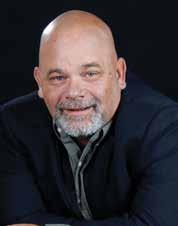
Dr. Rick Chromey is an author, historian and theologian who speaks and writes on matters of religion, culture, history, technology and leadership. He’s the founder and president of MANNA! Educational Services International. Rick and his wife Linda live in Star. www.mannasolutions.org.
Sources:
1 Draft Reply to the Danbury Baptist Association, [on or before 31 December 1801],” Founders Online, National Archives, https://founders.archives.gov/documents/ Jefferson/01-36-02-0152-0002
2 Reynolds v. United States, 98 U.S. 145, 164 (1878): https://supreme.justia.com/cases/ federal/us/98/145/ and Pierce v. Society of Sisters, 268 U.S. 510, 513 (1925): https:// supreme.justia.com/cases/federal/us/268/510/
3 Samuel T. Spear, Religion and the State, or The Bible and the Public Schools (New York: Dodd, Mead & Company, 1876): 224
4 Everson v. Board of Education, 330 U.S. 1, 18 (1947): https://supreme.justia.com/cases/ federal/us/330/1/
5 Engel v. Vitale, 370 U.S. 421 (1962): https://supreme.justia.com/cases/federal/ us/370/421/
6. Abington School District v. Schempp, 374 U.S. 203 (1963): https://supreme.justia.com/ cases/federal/us/374/203/
7 Commentaries on the Constitution of the United States by Joseph Story (Boston: Charles C. Little and James Brown, 1851), 597.









By Rosie Main
As the Christmas season approaches, our hearts are filled with joy, hope, and the spirit of giving. It’s a time to celebrate with family and friends, but it can also be a season of temptation when it comes to food. As Christians, we are called to honor our bodies as temples of the Holy Spirit (1 Corinthians 6:19-20). This year, let’s embrace the festivities while making healthy choices that nourish both our bodies and our spirits.
The beauty of the holiday season is found in the bountiful harvest of nature. Incorporating organic foods into our meals not only provides us with essential nutrients but also aligns with the biblical teaching of stewardship over creation. This Christmas, consider using organic ingredients in your recipes. Opt for fresh fruits, vegetables, and whole grains that are rich in vitamins and minerals.

For a delightful, healthier dessert, try making the following recipes.
This pie is a wholesome twist on a classic favorite, using almond flour for the crust and coconut milk for the filling. To prepare it, mix 1½ cups of almond flour, ¼ cup of melted raw butter, and a pinch of salt, then press this mixture into a pie dish to form the crust. Bake at 350°F (175°C) for about 10 minutes until lightly golden.


For the filling, combine 1 can of organic pumpkin puree, 1 can of coconut milk, ½ cup of stevia, 2 teaspoons of cinnamon, 1 teaspoon of nutmeg, and ½ teaspoon of vanilla extract. Mix until smooth, then pour into the pre-baked crust. Bake for an additional 40-45 minutes, or until set. This pumpkin pie is not only delicious but also packed with nutrients, making it a perfect addition to your holiday table.
Peppermint is a classic flavor of the holiday season, and it can be both refreshing and healthy. Consider preparing a Peppermint Hot Chocolate using unsweetened almond milk, a touch of raw cacao, and a drop of peppermint extract. Sweeten it with a natural sweetener like stevia or a little honey. This delightful beverage can warm your heart and spirit, reminding you of the joy of giving and sharing.
This Turmeric Coconut Milk Latte is a perfect way to warm up on a chilly fall day while providing a powerful immune boost. Turmeric is known for its anti-inflammatory properties, and when combined with the creaminess of coconut milk, it creates a delicious and comforting beverage. For the recipe, go to https://www.mainhealthsolutions.com/.../turmeric-coconut...
Sip on this warm, golden latte while enjoying the cozy vibes of fall. Not only does it taste fantastic, but the combination of turmeric and coconut milk also works wonders for your immune system, making it a great addition to your seasonal recipe collection.
Cinnamon is not only a warming spice but also offers numerous health benefits, including anti-inflammatory properties and the ability to regulate blood sugar. A simple way to incorporate cinnamon into your holiday meals is by adding it to roasted sweet potatoes. Toss organic sweet potatoes with olive oil, cinnamon, and a pinch of sea salt, then roast until tender. This dish is a perfect side for Christmas dinners and brings a touch of warmth to your table.
With numerous holiday parties and gatherings, it’s easy to overindulge. To avoid temptation, prepare yourself by eating healthy meals at home before heading out. Consider having a hearty salad with mixed greens, nuts, seeds, and a light vinaigrette. This will fill you up with nutritious foods and help you resist the urge to indulge excessively at parties. Another strategy is to bring a healthy dish to share at gatherings. Preparing a festive fruit platter with seasonal fruits such as pomegranates, pears, and apples can be a beautiful and healthy contribution. This not only showcases your commitment to health but also provides others with a nutritious option.
As we celebrate the birth of Christ, let us remember the importance of caring for our bodies and choosing foods that nourish our spirits. By embracing natural, organic ingredients and preparing healthy meals, we can enjoy the festive season without compromising our health. Let this Christmas be a time of joy, gratitude, and mindful eating, reflecting the love and abundance that God has bestowed upon us.
May your holiday season be blessed with health, happiness, and the warmth of family and friends. n
For further support with your health goals or more information, go to MainHealthSolutions.com.
By Vincent Kituku
A story is told of what King Fredrick William III of Prussia did as his country suffered huge financial losses due to wars. He asked Prussian women to donate their gold and silver jewelry to be melted down and converted to items that could be used as exchange for the things their nation needed the most. The women were given a bronze or iron decoration, with the inscription, “I gave gold for iron, 1813” as a token of the king’s appreciation for their contribution.
As the exercise gained momentum, the women started to value the gift from their king more than their jewelry. Their new possession was a symbol of sacrifice for their king’s cause, and as such, it became fashionable in the early nineteenth-century to wear a cross made of iron. That was the practice and the meaning attributed to the iron that led to the establishment of The Order of the Iron Cross.
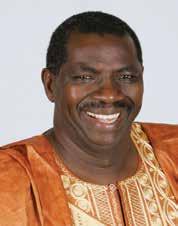
It is how we use our material possessions that bring meaning in our lives. The possession of things does not bring meaning to our lives, but it is what we do with our possessions.
Years ago, I learned that a poor woman I knew before I came to America had started fetching water from a spring and selling it to businesses. She would get 50 or so pounds of water in a bucket, place it on her head and transport it. Carrying heavy things on the head is dangerous. I was told by a chiropractor that my neck, due to carrying water that way in my youth, is as damaged as the neck of someone who has been involved in an accident.
Further, one must sell many buckets of water to make enough money to buy basic life necessities. But with a cart and two bulls, one could fetch 15-20 buckets of water in a single trip. That would be sufficient to support a family for several days and there would be no damaged neck. My family managed to help the woman with the purchase of two bulls, a yoke and a cart. After a while, I forgot about it.
When I visited Kenya in January 2010, the lady handed me some photos that were carefully placed in an envelope which was wrapped with a plastic bag. One photo still brings tears to my eyes. It was a photo of the cart we had bought for her and it had “Muli & Wanza” inscribed on one side. Muli is my given name and Wanza is my wife’s name.
That photo brings a meaning of life far different and fulfilling than all the photos of accomplishment that were taken of me in my three graduation ceremonies or of any of the material possessions of which I am blessed. Each day, we have the opportunity to add a meaning to our lives with the way we use our things. When our things are used for a cause, they become more valuable and their impact lasts, sometimes outliving us. The choice is ours to make our things bring meaning to our lives. n
Dr. Vincent Muli Wa Kituku, motivational speaker and author of “Overcoming Buffaloes at Work & in Life,” is the founder and executive director of Caring Hearts and Hands of Hope, a non-profit organization that raises tuition and fees for poor orphans and other children from poverty-stricken families in Kenya. Contact him at vincent@kituku.com or (208) 376-8724.

By Larry Banta
Why, my soul, are you downcast? Why so disturbed within me?
Put your hope in God, for I will yet praise him, my Savior and my God. – Psalms 42:5

In the Psalms, David mentions several times a sense of overwhelming sadness, discouragement. For him this sometimes was due to appropriate guilt from sin, and sometimes he, like many of us, experienced doubt in God as his life was anything but easy. He cried out to God and was able to keep his faith during those difficult times. Following the sadness, he expresses that his hope is in God. So, what are the winter blues? Do people tend to be more depressed in the winter season? For some the change of light and the increase in darkness seems to provoke depression. This is one kind of depression. For some the holidays are difficult due to maybe some bad experiences growing up. Or maybe the loss of a loved one during the holidays or just missing those who have gone during a time of family events. This makes it all the more difficult to get through the season. Some already suffering from a mood disorder find that the change of available sunlight, especially in the more northern latitudes, leads to worsening of the depression. What we call depression, something more than momentary sadness, has a variety of causes. Depression can be a medical or biological disorder or purely psychological or spiritual. One biologic cause is what we call SAD or Seasonal Affective Disorder. It is due to actual changes in the brain and may need a medical approach to find relief.
When we lose a loved one, a dear pet, or are grieving the deterioration of our loved one suffering a chronic disease, we can become depressed. If symptoms are severe, one must seek help. Usually, counseling is quite helpful or joining a grief-share group that many




congregations have can be good as well. Sometimes it may be necessary to use short-term medication provided by a psychiatric provider to fully recover. During the grieving process it is helpful to talk with others and process the grief, remembering the good times and the difficult times with the loved one, ultimately keeping the many good memories. As we grow older, we lose more and more of our loved ones. If we cannot grieve effectively, it may lead to more serious depression.
Sometimes depression comes as expressed in Psalm 51, from guilt due to sin. If we do not seek forgiveness, we separate ourselves from God. He is still there but it is like we put up a barrier and cannot experience Him as we focus on our sin. The depression from appropriate guilt can actually lead us to repentance and a return to God, so it can be helpful.
Have mercy on me, O God, according to your steadfast love; according to your abundant mercy blot out my transgressions.
Wash me thoroughly from my iniquity, and cleanse me from my sin!
– Psalm 51:1-2
Another type of depression may just come on with no prior stress or might be precipitated by a stressful or difficult event. It persists with a sad mood, loss or increase of appetite, poor sleep (may be too much or very little), low energy, lack of drive and motivation. School or work performance may suffer, there can be hallucinations (voices or visions of a very negative or self-destructive theme), there even can be problems with suicidal thoughts or behaviors. This can be serious and even life-threatening.
To treat this type of depression one must seek medical help. It is a medical disorder of the brain. Some family physicians may be knowledgeable with the mild to moderate cases but often one may need the help of a psychiatric professional. If the suicidal thoughts are persistent and one cannot be kept safe from harm, it may be necessary to utilize an inpatient psychiatric service. While in the hospital one can receive counseling as well as medical treatment of the disorder.



When the acute crisis is stabilized, counseling, along with medication, is the most effective means to recovery. (There are many good Christian counselors around but not too many Christian psychiatrists or psychiatric nurse practitioners.) The disorder is called Major Depression and is a recognized medical disorder. There are distinct changes in the brain that special scans can show when one is suffering from this kind of depression. This disorder tends to run in families and can be treated effectively.
For full or optimum recovery, it is best to take a whole person approach that includes the psychosocial (psychological and social) aspects of the disease as well as the spiritual along with the biological/medical so that all aspects of the person are considered. I call this ‘biopsychosociospiritual’. For the medical part there are many effective and inexpensive antidepressants on the market. There are also treatments such as Transcranial Magnetic Stimulation or TMS which works quite well, especially for those not responding to trials of medication.
For those suffering with SAD, there are special lights now easily purchased at Costco or Walmart. These are called full spectrum lights, or SAD lights. These have to be 10-15000 Lux (a measurement of light power). You would generally start the light in the change of seasons. I recommend starting around September 15 and stopping around April 15. There are guidelines for the light’s use. Generally, it is placed on a table next to a comfortable chair, perpendicular to your seat. It can be used morning or evening. You sit by the light for 30 minutes with occasional glances into the light. You can be reading a book or just relaxing. It is best to avoid screen time as the screen light interferes.
Suffering from depression makes us quite vulnerable in many ways. We need people and support, but we lack the emotional energy to connect. We may truly feel we are in the “valley of the shadow of
death.” Satan tends to kick us when we are down. There are more temptations. There is a tendency to turn away from God, blame God, or just ignore Him. We can come to a point of spiritual deterioration, which can make recovery all the harder. It is important that family and close friends understand what the depressed individual is going through so that appropriate support can be offered. Blaming and assigning spiritual guilt when there is none can put someone over the edge. There needs to be someone there to help pull you through the darkness, and help to keep your relationship with God intact. God will walk with us through the darkness and help us get back to the true light.
The rest of Psalm 23 is a reminder.
Even though I walk through the valley of the shadow of death, I will fear no evil, for you are with me; your rod and your staff, they comfort me. – Psalms 23:4
If during this season, or any other time, you are suffering symptoms of depression, there is hope. Effective treatment and counseling can get you back to living life again, with hope and joy, so you can beat the winter blues. n
Dr. Larry Banta is an author of several books, a retired psychiatrist, and a former missionary. He served in India, Mexico and Kenya. He and his wife, Evelyn, a counselor, travel together to provide consultation and training in various international locations.
















By Jenna Dexter
“I’m done,” I journaled on May 4, 2016. “I’m so emotionally spent and so confused. I don’t know what to do. God is supposedly leading me, but I’m not feeling led by any stretch of the imagination. I feel like I’m floundering about trying to figure this out on my own.”
Have you ever felt that way? Have you ever been desperate for God to show you what to do? Have you thought, “If I could just know Your will, God. And fast!”
Just 25 days prior, I had been given 42 days to move. My landlord was selling the property. Now I had 17 days, and as another journal entry declared, “I have not a clue where I’m going.”
But here’s the thing. Leading up to the epic “We’re sorry, Jenna, but you have to move” conversation, God had been speaking repeatedly that something “new” was coming. I have several journal entries about it. So when the unexpected hit, well it wasn’t entirely unexpected. God had been preparing me. And this gave me great peace. God had split the sea and made a way for me to live in this special place where my healing journey and new life had begun after the trauma of divorce. And I had all the faith in the world that He would do it again.
I’m kind of a “hearing God’s voice” geek. I study ways God speaks and love stories of how He spoke to others, such as described in YWAM (Youth With a Mission) founder Loren Cunningham’s book, “Is That Really You, God?: Hearing the Voice of God,” which I highly recommend.
I pay attention to the nuances of how God speaks to me. Reflecting on old journal entries, I’m blown away at what I documented throughout the “You have 42 days to move” saga. (Wait until you see how it ended!) Journaling is a great way to process, document, and learn how God speaks to you personally.
God gave me symbolism. Throughout the Bible God uses symbolism. On March 11, 2016, He highlighted symbols representing a coming transition, the promise of a new beginning.
God used repetition. By themselves, these were just symbols that “seemed” like God speaking. But what they represented came many other ways as well, because God often repeats Himself to confirm what He’s saying.
God gave me a knowing. Some people hear God by a knowing. I have learned I am one of those people. The best way to describe it is just a deep “knowing” that God is up to something. Sometimes it includes a “prompting” to take some sort of action. Two weeks before the conversation with my landlords I had this “knowing.” My journal entry used the word “stirring” and compared how it felt to two other significant times I’d experienced it, both of which were followed by God’s clear direction.
God gave me a dream. Four days before the landlord conversation, God gave me a dream. He had been speaking to me through dreams as part of my healing journey, which is another thing I had studied in depth. God spoke in dreams throughout the Bible, using symbolism and metaphors. In my dream I was sitting on the floor of a mobile home that my friend owned. Unlike actual mobile homes, this one had a steering wheel and gas pedal. My friend stood behind the steering wheel and said, “It’s time to go!” Then she began to back up the mobile home very quickly to move it. I couldn’t see anything, was nervous she might hit something, but just had to trust her.
My journal entry surmised that my friend represented the Holy Spirit telling me, “It’s time to go.” I had some very wrong guesses about what the “going” might look like, but wrote, “Here I am, Lord. Send me. I just want to be where you are.”
Four days later I sat with my landlords and discovered I was “going somewhere quickly,” all right. My “home” was in motion, I couldn’t see where I was going, and just had to trust the Holy Spirit.
I still experienced 25 days after that when I still didn’t know where I was going. Because my current place had taken a miracle, I needed another one to stay in the high-cost Northern California area near my daughter. As a former homemaker, homeschool mom, and wife of 23 years, I had no career, degree, or viable source of financial support. I lived largely on faith. Having explored my limited rental options, so far, God was not parting the sea.
And I had 17 days.
On May 4, 2016 I was at my wits’ end. In that journal entry I brainstormed every idea I could possibly think of, but nothing felt right. And then, the breakthrough came.
God speaks through closed doors. If no doors were opening, then perhaps it was time to think “outside the box.” “If I could do anything I wanted, what would I do?” I asked myself. I believe the Holy Spirit whispered this “thought” into my mind. Sometimes what seems like our own thoughts are actually God’s.
I considered my season of life. As a single empty nester, I had no ties to a relationship, career, mortgage, or other obligation. I was free to do something, perhaps, out of the ordinary. “What if I could travel … internationally?” I thought. Clearly ridiculous, right? Totally impossible. But the faith-filled optimist in me researched and actually found a way to solo travel long-term.
I’ve learned that more things are possible than you think. Especially with God. Was God parting the sea and making a way for something completely unexpected? Which posed the next question.
God, what is Your will? This was such a huge decision. Clearly I had to know God’s will. “What is the right thing, God?” I prayed and wrestled. I talked to my parents and prayed some more. God sometimes speaks through wise counsel.
Then God led me to a sermon, one that changed my view of His will. The pastor shared about a time when he faced three ministry options. He could stay at his current church, take a position with one in another state, or go to one in another country. He prayed and sought God extensively: “What is Your will, God? Which option do You want me to take?”
He finally heard God say, “What do you want to do?” Apparently God wanted him to think about his own desires! “Whatever you choose, I’ll bless it,” said God.
This was life-changing for me.
Turns out sometimes there is no “one perfect will of God.” Sometimes God wants you to choose. If you are seeking Him first (Matthew 6:33), reading His Word that lights your path (Psalm 119:105), delighting yourself in Him (Psalm 37:4), trusting and acknowledging Him (Proverbs 3:5-6), and are surrendered to His will (Luke 11:2), then you can trust that if He wants you to do something specific, He will tell you. Your own ears will hear Him. Right behind you a voice will say, “This is the way you should go,” whether to the right or to the left (Isaiah 30:21 NLT).
But if you are not hearing specific direction, perhaps He’s saying, “What do you want to do? Whatever you choose, I’ll bless it.” This can be freeing for many who are stuck from moving into something amazing out of fear that it might not be God’s perfect will. Sometimes we need to “test and approve” God’s will (Romans 12:2). We begin taking action to see if the thing we are leaning toward is right, with the peace of knowing God loves us and His grace is sufficient. I went to Australia and New Zealand, mate! Once I felt the peace to choose, I took a bold move, got rid of everything I owned, stayed with family a few months, then embarked on incredible adventures in Australia and New Zealand.
I drove a car on the wrong side of the road, on the wrong side of the car. I stayed in a combination of Airbnb’s, hostels, and with hosts who gave me free room and board in exchange for four hours of work a day.
Hearing God’s voice can be challenging. He is full of mystery and speaks in subtle ways. I believe one of the reasons He does this is to encourage us to spend more time with Him, seek Him more deeply, and listen more intently.
“My heart has heard you say, ‘Come and talk with me.’ And my heart responds, ‘Lord, I am coming’” (Psalm 27:8 NLT).
“I will bless the Lord who guides me; even at night my heart instructs me” (Psalm 16:7 NLT). n
Jenna Dexter is a speaker and Christian Life & Mindset Coach for Women. Through 1:1 coaching, she helps women discover hidden dreams, shine in their calling, overcome mental hang-ups, believe in possibility, and unleash confidence. Join Total Thrive Women, a membership community empowering Christian women to get personal, spiritual and professional results through group coaching, a community forum, personal development trainings and more. Learn more at www.TotalThrive.com.






By Bradley Shotts
“I am the way, the truth, and the life. No one comes to the Father except through me.” – John 14:6 (NIV)
If you are a follower of Jesus Christ, you probably have had several moments of astonished pause, observing all of the change within our world and country the past few years. One thing that has not changed is God. He remains the same.
The Bible says in Hebrews 13:8, “Jesus Christ is the same yesterday, today, and forever.”
God is not surprised or taken aback by the things of this world. He warns us in 2 Timothy 3:1-5 (NIV), “But mark this: There will be terrible times in the last days. People will be lovers of themselves, lovers of money, boastful, proud, abusive, disobedient to their parents, ungrateful, unholy, without love, unforgiving, slanderous, without self-control, brutal, not lovers of good, treacherous, rash, conceited, lovers of pleasure rather than lovers of God – having a form of godliness but denying its power. Have nothing to do with such people.” This is an accurate description of our world and the people in our country today.
As Christians, how are we to respond to the events that face us in these times of cultural change? As we see the world drifting and running further away from God, His values, and His commandments, we must be diligent to draw closer to Him. James 4:8 says, “Come close to God, and God will come close to you.” Satan is hard at work to do everything he can to distract us, to entice us, and to lure us away, so that our focus is taken away from God. So many have fallen victim to Satan’s devices.

It is important to understand Galatians 6:7. What is the Apostle Paul telling us? It reads, “Do not be deceived; God is not mocked, for you reap whatever you sow.” Paul explains that our way of life will have its natural consequences. If we “sow to the flesh,” led by self-seeking desires, we will reap the only thing the flesh can and will produce – corruption. But if our lives sow into the “Spirit of God,” and the ways of God, this leads to life everlasting. Sadly, Satan has blinded the eyes of so many that they are unable to see the truth.
Perhaps right now you see your life and the choices that you have made. Are they choices that have led you down the wrong path, clearly against the teachings of God? Satan makes it so easy for this to happen. The beautiful thing about our God is that He specializes in messes and mistakes. He is not a God that looks at us from afar, seeing our sin and mistakes, gazing at us in anger. Instead, He sits close by, lovingly waiting for us to whisper His name so He can come to our rescue. He longs and desires to have close communion with you and He accepts you as you are.

Only God can give you the peace within that you have spent your entire life trying to find. This world and all the things of this world will only disappoint and leave you with nothing. It is only when you call upon the name of Jesus that you find fulfillment, purpose, and life everlasting. Do you want to experience life as God intended for you? The Bible instructs us to call upon His name and there you will find Him.
Pray with me. “Lord, I admit that my life is a mess. I have made mistake after mistake. Everything I have tried has left me empty inside and with nothing. I am lost, but today I am making the decision to call out Your name, Jesus! I am asking You to forgive me of all my sins and to come live inside of my heart. I want what You have for me and I choose this day to live for You. Amen.”
If you prayed this prayer with sincerity, you are now a child of God and the Holy Spirit of God has come to live inside of you. God has completely forgiven you of all of your past sins and He only sees you now as His child, filled with His righteousness. Spend time in prayer with God and read His Word (the Bible) to gain strength and direction. Welcome to the family of God. n
Bradley Shotts began his ministry in the funeral industry in 1988 at Lloyd James Funeral Home in Tyler, Texas. He currently serves as a director at Slay Memorial Funeral Center, Aubrey, Texas. He and his wife, Amy, live in Bedford. They have two adult children, Blaine and Braylee, and one grandson, Matthew Bradley. Shotts is a member of Rotary International and enjoys serving in his community. As God directs, he enjoys singing and speaking. He is an ordained minister and loves being used of God.
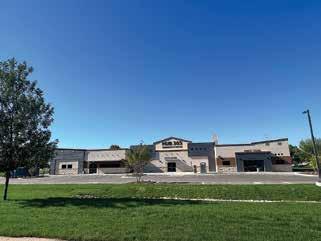


Celebrating Life Through the Arts, art classes: Thursdays at 6PM
Veterans Day Dinner - Veterans & Family Join us for dinner on 11/11 at 4PM. RSVP by 11/6 to 208-986-0050, LM w/name & number
Thanksgiving Day Lunch - If you don’t have plans, join us for lunch on 11/28 at 1PM. RSVP by 11/22 to 208-986-0050, LM w/name & number
Christmas Eve Brunch -If you’d like to join us or brunch on 12/24 at 10AM RSVP by 12/19 to 208-986-0050, LM w/name & number
Check out our Facebook page for Classes & Events

HUB 365 is an all volunteer ser vice organization. Procee ds from our sales will fund various programs for the
By Greg Grotewold
Know this, my beloved brothers: let every person be quick to hear, slow to speak, slow to anger. – James 1:19, ESV
There are some passages of Scripture that require, if we are to apply them as God intends, assistance from the theologicallytrained. They are deep, nuanced, and ripe for gross misinterpretation if imprudently handled. James 1:19 is not one of them. The average layperson, like you and me, can read the short verse and immediately come away with its aim. We are to listen more than we talk and not become easily angered. It’s no more complicated than that.
Or is it? While at face value, the verse is in fact easy to comprehend. It’s not perplexing or abstruse. We don’t need a Bible scholar to tell us what James is getting at. However, it can be mistakenly applied – if not slightly misinterpreted – if certain subtleties go unnoticed. Two come to mind and only because of my own past failures in recognizing them.
The first pertains to simplicity itself. While the ambiguityfree nature of the verse is a good thing, my level of intellectual comfort with it poses a certain trap. I’m beginning to learn how easily I can convince myself into believing that knowing is doing. Somehow my familiarity with the passage creates a false sense of adherence to it. It’s as if I take the command for granted and somehow conclude I’m a good listener even though there is evidence to the contrary. The fact is, knowing is not doing; they are






not one in the same. Acting on a verse is a separate exercise from comprehending it, and obedience requires both. James makes this perfectly clear a few verses later. “But be doers of the word, and not hearers only, deceiving yourselves” (v. 22, ESV).
The second regards the doing part. Even if I accurately understand the passage and recognize there’s a difference between knowing and doing, that does not mean the action I take guarantees adherence.
How we “do” James 1:19 matters. It’s more than the mere absence of talking. Through pure grit, I can force myself not to speak and force myself to audibly hear the words another shares. But that is not what James has in mind. Truly hearing someone is fundamentally about the heart, not the ears, for the passage tells us to be quick in doing so. If I am quick in executing something, it means a certain desire exists. With proper listening, there is a desire to truly know the thoughts of the other and not for some retaliatory purpose. There is an eagerness in knowing what’s on their mind so that care can be offered, whether it be assistance, empathy, affirmation, or just a safe place to vent. It’s not that good listeners don’t speak; they do. It’s just that the words spoken propel not deter the conversation, further enabling the other to be more fully heard and thus known.
If that which above is the mark of obedience, I have work to do. Too often my aim isn’t to encourage, edify, or empathize but to fix, direct, instruct, defend, admonish, and at times even attack. Clearly, I’m not consistently obeying James 1:19 and am beginning to understand why. It’s because I’m not consistently obeying





Philippians 2:3. Paul writes, “Do nothing from selfish ambition or conceit, but in humility count others more significant than yourselves” (ESV). I seek in the context of a conversation to fix, direct, instruct, defend, admonish and attack – in other words, listen poorly – because I carry into it this fundamental belief that I have more to offer. I intellectually exalt myself over them. While it hopefully does not manifest itself that abruptly, that is exactly what is happening in the far recesses of my heart. And it’s nothing more than putrid self-righteousness. I hate it and so does the Lord, for such self-importance kills dialogue and damages relationships.

How do I combat this deeply ingrained pride? How do I truly see others, per Paul’s instruction, as more significant than myself? It’s becoming increasingly clear. I must with greater frequency empty myself of myself, which requires that I with greater frequency reacquaint myself with myself. In other words, I need to be reminded of the gospel and the fact that had Jesus not mercifully and providentially redeemed me, I would be utterly lost and destined for eternal wrath. There is absolutely nothing I did to secure such favor. Nothing. It was the gracious hand of a free and sovereign Lord who rescued me. A daily contemplation of this reality I trust will help buckle the legs of the pedestal on which I am perched.
Such leveling is crucial, for pride is the most dangerous of sins. It’s not only the harbinger for all others but the one transgression that causes me to think I’m God. And as you can gather, there



is no greater assault on His glory than someone like me trying to steal it. As you can also gather, He will oppose me when I do (James 4:6). For at the very moment I exhibit such self-importance, I become in His eyes the exact opposite and subservient to the person with whom I am speaking. I devolve into the antithesis of what I’m betraying and forfeit my significance. Though not by choice, the high will go low and be strong-handed into fulfilling the verse. While the Lord’s admonishment may seem harsh, in reality it’s an act of incredible love. He knows that without such correction I will continue to forgo the blessing He deeply desires to lavish upon me.
It obviously will go far better for me if I am the one who initiates such lowliness, not God. As James 4:6 also points out, the low go high. When I humbly submit, He will elevate me. The difference between self-elevation and His elevation of me is important to understand. When the Lord does so, it’s based upon His worth, not mine. In other words, His value is imputed to me. I don’t know how all of this happens, but it is as glorious as it is mysterious. I am a glad beneficiary of such astonishing grace. May we be quick to go low in our conversations with others. If we do, God will greatly bless both participants. n
Greg lives in Oakdale, Minn. with his wife, Sandi, and their two sons, Luke and Eli. He is a deacon in his local church and greatly enjoys serving in this capacity.

















By Bethany Riehl
“Oh, magnify the LORD with me, and let us exalt His name together!” – Psalm 34:3
Recently a friend shared that in her mentoring of a group of young women, she was feeling a bit overwhelmed. Their problems and their interests are big, painful, and worldly. She confessed that she wasn’t sure she was equipped to help.
Do you ever feel this way? I know I do. I have had many friends and family members enduring what felt like insurmountable trials and all I had to offer was a shoulder and what I knew of the Lord. And sometimes I walked right into the sin of believing that wasn’t enough. I wanted to be able to fix them, to point them to just the right article or bring them the right gift at the right time to make them feel loved and seen.
My focus was on me and what I could do to carry them through, on what wisdom I could impart.
A few months ago, I read a book written by a biblical counselor and I squirmed in my seat as he described a young woman that came to him for counsel. She had the worst story I’d ever heard. Abuse and betrayal as a child, followed by her own years of promiscuity and sin as an adult. I wondered how anyone could actually give her hope for her shredded life. When I read how the biblical counselor helped her, I was ashamed of myself for wondering. He magnified Christ.
He systematically walked this broken woman through the attributes of God; walked her out of her despair and into the arms of the Savior. Jesus didn’t come to make “broken things beautiful,” He came to raise the dead to life, and that is more powerful than any hug or Christ-less encouragement that we can offer the downtrodden.
If for some reason this sounds cold or distant, let me encourage you: we can’t magnify Christ without being compassionate and gracious. That is who He is and we cannot truly point someone to Jesus without a heart of compassion and love. If you need a quick snapshot of Christ’s power to save, read Mark 5 for three stories of Him saving people from unfathomable circumstances. Take note of the mercy He has on each person as He sets things right.
A.W. Tozer said, “…the most portentous fact about any man is not what he at a given time may say or do, but what he in his deep heart conceives God to be like.”
Fortunately for us, God told us exactly what He is like and what
“Then the LORD passed by in front of him and proclaimed, ‘The LORD, the LORD God, compassionate and gracious, slow to anger and abounding in lovingkindness and truth; who keeps lovingkindness for thousands, who forgives iniquity, transgression and sin; yet He will by no means leave the guilty unpunished; visiting the iniquity of the fathers on the children and on the grandchildren to the third and fourth generations.”
Moses made haste to bow low toward the earth and worship (Exodus 34: 6-8).
As one pastor said, our God not only possesses love and truth, He abounds in it.
What else do we have to offer but Christ?
If you know someone on the right side of a conflict, they don’t need affirmation that they’re right; they need to hear that God sees (Genesis 16:13).
If you know someone working through the memories of an unstable childhood, you can encourage them with God’s eternity – He is everlasting. The same yesterday, today, and tomorrow (Hebrews 13:8).
If someone has been abandoned by their spouse, encourage with this promise: God never leaves His children (Hebrews 13:5, Matthew 28:20).
He is omniscient (He possesses perfect knowledge); how comforting that can be as we pray to Him for guidance in an election year (James 1)?
He is sovereign; nothing comes into our lives that has not passed through His hand and all that He does is for our good and His glory – even the hard stuff that we can’t understand belongs to Him.
He is omnipresent – what a comfort that is to the lonely!
He is perfect in holiness – He will never sin.
This world, it can feel like a slog, no? But where are our eyes pointed? That’s what will help us walk upright in the slog.
I recently had the opportunity to hire a trainer for our new family dog, Frenchy. Frenchy had already been trained, but I didn’t know her commands and she didn’t even think to listen to me on walks. She was excited and distracted by everything around us and was so caught up in tracking smells (did I mention she’s a lab?) on the ground, she didn’t even remember I was there. When she finally knocked me off my feet trying to visit a Golden Retriever on the other side of the road, I decided not to walk her again until we went

We practiced in increasingly hard settings until we both mastered this, and now if she’s getting too excited on a walk, or I need her attention, I tell her to look at me. She stares into my eyes until the distraction has passed or she calms down, and then we can go on our way.
Each time I do this, I can’t help but think of the many admonitions in Scripture to seek God’s face (2 Chronicles 7:14, Psalm 27:8, Hosea 5:15, just to name a few).
All of our satisfaction can and should be found in the Lord. Our every need is provided by Him. If we seek Him and His kingdom first, knowing that all things come from His hand, every other earthly joy is simply a pretty decoration on a fully iced cake.

Bethany
Each time I’ve been overwhelmed or dumbfounded about how to help someone in need, I’ve been able to take another look and realize that it’s because I’m magnifying myself or their trial instead of Christ. Not only is that meaningless, but it’s also wicked.
When we magnify Christ – His love, His truth, His attributes – we find all the answers we need for any situation.
If you need help this season, training your eyes to be fixed on Him, I encourage you to memorize Scripture. Psalm 145 is an excellent place to start.
God rest ye, merry, my friends. Our Savior has come, and He is walking us through this life. Our eyes fixed on His is the best way to walk with assurance and peace. n
Bethany Riehl lives in the Treasure Valley with her husband, three kids, and a dog. She writes articles and fictional novels when she can, and her one desire is to point others to the love and sufficiency of Jesus Christ.














